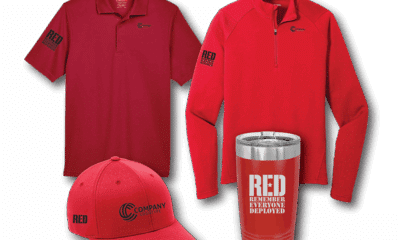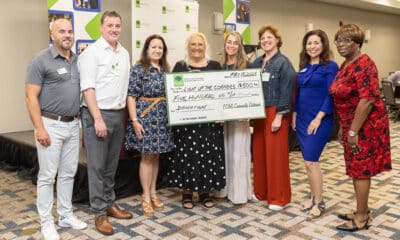Business
Capitalist Sage: Wendy Kinney talking shop on effective networking
Published
6 years agoon
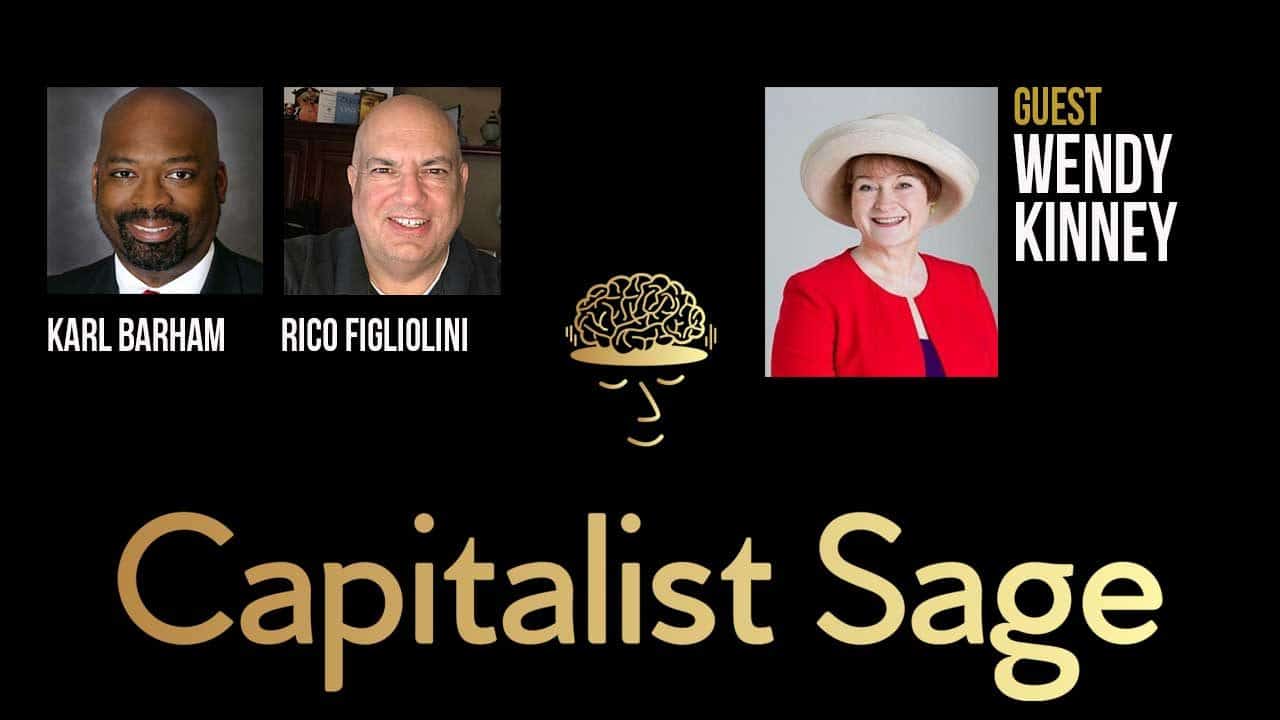
Wendy Kinney, Power Generator, giving her sage advice on networking with your hosts Karl Barham and Rico Figliolini. Recorded at Atlanta Tech Park in City of Peachtree Corners, Georgia
Summary
In this episode of the Capitalist Sage Podcast, Karl and Rico talk to Wendy Kinney – a referral marketing expert. Wendy shares knowledge and advice about how to find networking associations that are a good fit, common mistakes people often make in a referral market, and the importance of referral marketing in expanding your network.
Resources
Power Core:
How to contact Wendy: 404-816-3377
“So, someone once explained to me that the difference between a homeless person and Warren Buffet is timeline. The homeless person wonders what he’s going to eat tonight. Warren Buffet knows what his grandchildren are going to eat. So the homeless person is thinking, “Can I get 20 bucks. Can I go to burger king?” Warren Buffet is thinking, “Where am I gonna take my family on vacation three years from now?” And that timeline is crucial for referrals. Cold calling is – I’m gonna call you, I’m gonna interrupt what you’re doing, you’re either gonna say yes or not to me, and I’m gonna move on. Referrals has a timeline. And that’s the first thing that people miss. They want it to be instant.”
Wendy Kinney
Audiences transform from groups of passive strangers to active, individual participants learning new skills together. People are meeting. New contacts are being made. Sparks fly.
Wendy Kinney created Ready… Set… Go Make Money! networking methodology from her 21 years of researching, experimenting and confirming what works for networking.
She opened the Atlanta office of PowerCore in 1995; since then PowerCore Teams in the metro Atlanta Area have connected more than 15,898 Members.
Wendy continues to guide Atlanta’s entrepreneurial community into the lucrative and exciting world of network and referral marketing. And she’s gone global, bringing her proven methods and innovative techniques for creating ah-ha’s and shocks of recognition to corporate events around the world.
For more information visit www.WendysDesk.com, or contact Wendy via 404-816-3377 or Wendy@PowerCore.net
Podcast transcript:
Karl [00:01]: Welcome to the Capitalist Sage Podcast. We’re here to bring you advice and tips from seasoned pros and experts to help you improve your business. I’m Carl Barham.
Rico [00:08]: And I’m Rico Figliolini.
Karl [00:09]: I’m with Transworld Business Advisor, and Rico is with Mighty Rocket Digital Marketing and the publisher of the Peachtree Corner Magazine. Rico! How about telling us about our sponsors today?
Rico [00:22]: Sure. First thing is – I just want to let you know, we’re in the podcast studios at Atlanta Tech park in Tech Park Atlanta.
Karl [00:30]: That’s right.
Rico [00:31]: Love the name. It’s in the city of Peachtree Corners. So we’re in the middle of this accelerator here in Peachtree Corners. Now what is that – the incubator that’s at Prototype Prime just down the block. So this is a great hub for technology. So this is where we’re at doing this podcast.
Karl [00:49]: Part of Curiosity Lab of –
Rico [00:52]: Well, Curiosity Lab actually encompasses now Prototype Prime as long as a one and a half mile autonomous vehicle track, and I think it’s the Georgia Tech professional education services that’s being conducted out of there as well.
Karl [01:08]: Absolutely. A live lab in Peachtree Corners. Fabulous.
Rico [01:11]: So one – the only one I should, probably one of several, but the only one that made it in Atlanta. A live lab where people can actually put their autonomous vehicles and stuff into a real track. So that’s where we are here, just to give you an essence. Peachtree Corners magazine and the family of podcasts which includes Capitalist Sage is also a media sponsor for Smart City Expo Atlanta, which is an offshoot of the annual Barcelona event that’s done internationally. So this expo happens in September – it’s the first one in North America. Curiosity Lab in Peachtree Corners will have an offsite demo place in its racing place that the attendees of this expo can come to and check out the track and all the stuff that’s gonna go on there. Because they should hopefully be done in about 48 days – at least the PC portion of that to be able to share. The Smart City Expo is the first one of three years that are going to be here and the World Congress Center, and it’s right at smart cities and bringing it down to the people that would actually be using it on the boardway. So not just businesses. And, also want to welcome, for the first time, Gwinnett Medical Center. They’re a sponsor of our podcast as well. So they’re actually opening up a place – they’re entering Peachtree Corners. It’s called the GMC Primary Care and Specialty Center of Peachtree Corners, and they’re gonna have a lot of premier, first rate primary care services and specialty services. For those people that want to know where it is, if you’re familiar with the old Abuelita’s restaurant, which is the building that’s been completely gutted and renovated, just south of the QT of Peachtree Corners.
Karl [02:57]: That’s right. Right across from the farm. So if you can find the farm, you’ll be able to find this medical center.
Rico [03:01]: And if you find the QT or Climate Smoothie which is in that same place.
Karl [03:05]: That’s it. Good – thank you very much for introducing our sponsors. Today’s guest is Wendy Kinney. An entrepreneur, business owner, network and relationship marketing expert. Wendy opened the Atlanta office of Power Core back in 1995 and has connected over 15,000 members, helping people grow their business through network and referral marketing. Just want to thank you for joining us today, and why don’t you introduce yourself a little bit more to our audience?
Wendy [03:36]: Thank you, Karl, I’m honored, and Rico – I’m honored to be invited and participate in this. I think you’re doing good work, so, that’s good.
Karl [03:44]: Thank you. Why don’t you tell us a little bit about how you got into this space?
Wendy [03:49]: I visited my first Power Core team, and all Power Core meetings are at seven o’clock in the morning, in Melbourne, Florida at the Hyatt across from the airport. And it was two hours from where I lived. And the reason I agreed to go to a 7 AM meeting two hours from home, because you’re already doing the math on what time they had to leave and get up and all that, right? Was because I’m incredibly shy. I had a hard time getting to events that were close to home. I would very often get dressed, get in the car, drive in the event, circle the parking lot and get home. And I figured if it was two hours away, I would actually go in because if I embarrassed myself, I wouldn’t have to kill anyone. So that was my first experience in that situation.
Karl [04:33]: Oh wow, fabulous. So when you found Power Core – why don’t you describe what Power Core is for folks that don’t know?
Wendy [04:40]: So, it’s a business referral network, and there are 21 different types of networking associations. So think of them as languages. Think of them as Greek and French and Spanish and Portuguese. And if I prepared for a trip to Brazil by taking Spanish lessons, when I got there, I would be, best case, ineffective and, worst case, offensive because they speak Portuguese, right? And so, associations are like that too. Each association has its own purpose, has its own language. And Power Core is the type of association that is codified, close contact. And what that means is that there’s a group of people who meet once a week. These people are not in competition with each other. And their purpose is to build the credibility required to recognize and refer their clients to each other. So they know each other closely. And this – the reason that that very first meeting worked for me was because one of the presentations was being done by the CPA. And I sat there during his presentation taking notes and thinking to myself, “How come the guy I’m paying isn’t telling me this? Why isn’t my own CPA telling me this?” And it was so powerful to me to recognize, and I could see right there already, that if I had a question, I could ask the banker. Just right after the meeting, and he would have answered me. If I had a question, I could just ask the attorney, and he would just answer me. And I didn’t have another place in my life where that existed. And that was my motivation. I – I know that most people join because they want the referrals, right? But my motivation was – I need these people in my life. I had just come off a very bad business failure. Do you want to know what it was? I bought a restaurant.
Rico [06:25]: That’ll do it all.
Wendy [06:28]: Big mistake. Big mistake. And what I realized, sitting there, was – if I had had these people in my life, I would have not been a failure as a restauranteur.
Karl [06:40]: That’s fabulous – it’s interesting having advisors and people that you can go to to help you at – grow your business is really key. And having this group that, by structure, you’re getting to know them very well, I could see that building kind of, like, almost a board of directors, a kitchen cabinet, or small council – whatever you want to call them. But they’re these people that you can go to for those questions. And along the way, you happen to be able to help each other do business.
Wendy [07:10]: Yes. Yes. And when I first joined, I didn’t think anyone would have referrals for me. I was wrong, but I was clear. And what I learned and what I tell people now is – these people are cheering for your success more than any other people in your life. More than family, more than anyone. These people want you to be successful. They’re building you up, they’re holding you up, they’re introducing you to prospects. This is your cheerleader, right here.
Karl [07:38]: So what do you think people miss, when you see folks looking to grow? So I talk to business owners all the time. Pretty much most of them have a revenue problem. They don’t grow enough money. You ask them, “What do you spend on marketing, what do you do for marketing?” They say, “Referrals. I built my business on referrals.” What are they missing when they’re looking at their business and how they’re approaching it and how someone that really wants to really drive their business using referrals can do.
Wendy [08:05]: Yeah. Two things. The first thing that they’re missing is timeline. So, someone once explained to me that the difference between a homeless person and Warren Buffet is timeline. The homeless person wonders what he’s going to eat tonight. Warren Buffet knows what his grandchildren are going to eat. So the homeless person is thinking, “Can I get 20 bucks. Can I go to burger king?” Warren Buffet is thinking, “Where am I gonna take my family on vacation three years from now?” And that timeline is crucial for referrals. Cold calling is – I’m gonna call you, I’m gonna interrupt what you’re doing, you’re either gonna say yes or not to me, and I’m gonna move on. Referrals has a timeline. And that’s the first thing that people miss. They want it to be instant. Yeah.
Rico [08:48]: I’ve been – I didn’t do Power Core. I did another – I won’t name it – I did another networking group. And the other networking group was more like – wasn’t like this. I mean they had the –
Wendy [09:03]: I think you should name it. I really do. Just because it will be clearer.
Rico [09:07]: It’s been a long time, it’s BNI.
Wendy [09:10]: But I just think it’ll be clearer.
Rico [09:11]: Okay. So BNI is this Business Network International. It’s been around a long time. Same thing. 7 o’clock in the morning, we all did the one minute, two-minute elevator screens. We all had to share leads. It was almost mandatory – it was almost like you were shamed if you didn’t do it. And it was always typically the same type of business. An accountant, lawyer, it’s always the typical. And I just felt very – I just wasn’t feeling it. And I’m –
Wendy [09:45]: So here’s – here’s my response to that. I believe that associations are like blue jeans. Not every pair of jeans fits every butt. Can I say that? Do I need to rerecord? And as soon as you try it on, you know if it’s a fit for you or not. And if it’s not a fit for you, it’s okay. There’s nothing wrong with you and there’s nothing wrong with the jeans. So I have no illusions that anyone should belong to any one type of association. I think that’s part of the reason why there’s 21 different associations. I think we all need to belong to three different types, but it doesn’t matter which type we belong to. As long as we work each type according to its purpose, right? So. Finding out, and finding out quickly, that it’s not for you – I think that’s a good thing.
Rico [10:34]: Yeah, I don’t disagree, and it didn’t take me too long. I think it was about four or five weeks, which I thought was long, I thought I needed to do a little bit more. And I found my network and my referrals confirmed with different –
Wendy [10:46]: So I want to – I want to address how long is long enough. Just in the general referral marketing thing. So I told you that I belonged – I believe that we each need to belong to three different types of associations. I believe very firmly that we need to belong to an association where every member is a prospect. Now that would not be a close contact association. So if someone went to a close contact association, selling to the people at the table and the people at the people then buy with them, they would think they were unsuccessful. However, it would be because they were speaking the wrong language, right? So that’s really important. So there needs to be, in my marketing portfolio, one association where every member of that association is indeed a prospect for me. There needs to be a second association in my portfolio where every member is a gate opener for me. A gate opener is a person who will never do business with me personally, but is in a position to send me one referral a month like clockwork. And I need to belong to a third association with this broader cross-section of people as possible. And for most people, that’s what Power Core is. Where there’s this broader cross-section of people – so watch, I’ve got depth in the first two, I’ve got width in the second one. And that depth and width is what gives a marketing plan stability. And I believe that everyone needs to belong to those three things, and then – and so here we go. Here’s – I know that was a long answer to come back. Once my private clients make those three choices, it’s a three year decision. So now we’re coming back to the difference between the homeless person and Warren Buffett. So the important piece here is, five or six weeks isn’t long enough to know. It’s just not. And it’s long enough to know the jeans don’t fit or you don’t like the jeans, right? But once people make a decision, the difference between success and failure and referral marketing is being a member long enough for these people to know you. So the team I was at today – I was at Cumberland today. And David Arnold turned in a business slip from a guy who was a member of his team fourteen years ago. Fourteen years ago. And now he’s moving to Denver. Now. Fourteen years later! Of all the real estate agents in the greater metro area, this guy knows David the best. And that’s a long – that’s a Warren Buffet time frame, right? So when people use – there’s only three ways to get new clients. Advertising, cold-calling, referrals. When people use an advertising or cold-calling mindset in a referral marketing plan, you’re always gonna be ripping up these plans before the roots have had time to form.
Karl [13:25]: Yeah. It’s a good thing to know as I’ve ventured out and talked to a lot of the folks and participated in some of these different – getting to know people, part of it, if you think about it, it’s hard for me to refer to you, and we’ve known each other for a while now. And we’ve worked together, and I know what you do, little by little, many small conversations. I know details. But I now know how to listen for things. And I’ll say, “Hey Rico, there’s someone here that you need to talk to because of our conversation we had” that if we didn’t stick through this and meet every week and chat all the time, I wouldn’t have known that.
Rico [14:04]: You know what I find out – I find that I don’t know the two organizations you’re talking about – all have to be networking, quote networking? Because what I find is that, when I belong to an association, let’s say the America – the Atlantic Marketing Association, which is going to –
Wendy [14:21]: That’s a really good example of an industry specific association.
Rico [14:25]: Now, there I find that, because maybe because of what I do particularly –
Wendy [14:31]: No, I think these jeans just fit your personality.
Rico [14:35]: Maybe. Because I don’t like being necessarily a member in an organization as opposed to being a board member. I want to be an effective person that could bring value to that organization. And in doing so, expand the value of the organization. And bring – and when you do that, I think, when you get in, then you get it.
Wendy [14:55]: Yeah. So the key in this three-year trajectory is to be a visible, committee member or board member by the end of the first year. So everyone needs to be on a leadership track, a visibility track – just from the very beginning. Go find out where there’s a hole that fits me, right? Because I don’t want to volunteer for a board position that’s onerous for me, right? Find – always work in your area of strength. Always work in your area of strength.
Karl [15:24]: That leads me to one thing that does, when people get that involved, it starts building credibility. I know that’s one of the important elements of getting referrals. Help folks understand why credibility is so important and how people build that and build that.
Wendy [15:39]: Yeah, so I just came from a lunch conversation with someone who was referencing a person who we both know. And he cost himself any referrals from her or from me because he blew his credibility. And he blew his credibility in very specific ways. The easiest way to get credibility is to say, “I’ll call you at 10 o’clock tomorrow,” and then do it! Right? Because if I say I’ll call you at ten o’clock tomorrow, and at ten o’clock tomorrow I get your voicemail and I say, “Hey this is Wendy,” you’re gonna listen to that voicemail and go, “Ooh, she did what she said she was gonna do.” If you answer the phone, you’re gonna be, “Okay, she did what she said she was gonna do.” I can count on her – if I refer to her, my clients are going to experience the same thing. The easiest way to bust credibility is to not do what you said you were going to do. So whether that is not performing well as a leader, or not showing up for a lunch appointment, or not performing in some other way that I said I was going to, that’s referral death.
Karl [16:44]: So I’m wondering. As people start putting together a plan on building credibility, are there tools and strategies that they can use to start to pull some of this together to be more effective in getting referrals?
Wendy [16:59]: Yeah. So, so let’s start with the concept of meeting one-on-one for coffee. So those one-on-one meetings, as you just expressed to Rico – those meeting where people are just talking and beginning a friendship because referrals are always between friends. And beginning that friendship – those are really important. So I can strategically make a plan to have one coffee meeting in between every meeting with the association. So you like AMA meets monthly – in between every month’s meeting, you’re going to have lunch with some person from that association. Now watch what happens. Remember my three-year path. In month number one, you have lunch with Art. And when you go in month number two, Art’s gonna say – “Oh, hey! I want to introduce you to Scott, Tom and Jerry.” And in month number two, you’re going to have lunch with Betty. And when you go onto meeting number 3, Betty’a gonna say, “Oh I want to introduce you to Carla and Deborah and Sally.” And in month number four – are you getting it? And so what happens is – if you have lunch with one person in between every meeting, those people become your advocates and your champions at the next week’s meeting – or the next month’s meeting. And by the end of twelve months – twelve meetings, you’ve got a whole group who knows who you are and knows your name and recognizes you – I don’t know what you do yet. But they know who are, they know what you do, they know your name. And if you saw them Friday night at pizza, they’d come up to your table and say hi! When people don’t have a proactive strategy to do that, networking doesn’t work for them.
Karl [18:43]: That’s super key. I notice that another thing, as you start talking with folks, in the cold networking kind of groups, if you’re trying to sell to people, that’s speaking the wrong line.
Wendy [18:57]: It’s so speaking the wrong line.
Karl [18:59]: So if I’m trained in sales, and I know – I don’t know if you’re familiar with Challenger, Inside Be Sellings – some of those kinds of things. One of those key things is changing the way someone thinks introducing new information.
Wendy [19:12]: Right.
Karl [19:13]: If you’re not supposed to be selling to – to Rico – because he’s not supposed to, he’s not my customer, what should I be spending my time telling Rico?
Wendy [19:22]: Right. So, the book, The Secret Life of Pronouns is fabulous. The author is James Panabaker, he’s a University of Texas at Austin. And one of the things that he describes is how our use of pronouns affects how people react and respond to us. So the pronouns, “we” – this is what we do – and “you” – I can help you – are sales pronouns. And neuro linguistically they call them vertical. So these pronouns make people think – “I need this, I don’t need this. Yes, no, up, down, in, out. This is for me, this is not for me.” These pronouns – what an incredible power – stop referrals. Because when I’m speaking to Rico, and I say, “Well, Rico, what I can do for you is…” – Rico either thinks “Oh, I like that” or “No I don’t.” And then we’re done. He’s not thinking laterally, which is what neurolinguistics call the pronouns “I” and “they”. So when I’m speaking to Rico and I say – “What I did for them was…”, now Rico thinks what is like or what is not like what she’s talking about. So I was just talking with Heather, and she said, “I’m a good referral for your friends who have coffee table books of the places they’ve visited.” Well, immediately, when she said that, I thought – “Ooh, Kevin and Hal. They don’t have coffee table books from the places they’ve visited. They get some piece of art from every place they’ve been on vacation, and that’s their memento from the vacation.” Right? So that lateral thinking – it’s not a coffee table book – it’s a piece of art. That lateral thinking is how referral happen. And they happen with the pronouns, “This is what I did for them” – the person who’s not here. Not “This is what we can do for you,” the person who is here. And that’s key to referrals. Just key.
Rico [21:13]: You know, that’s funny. Because I’ve gotta believe that’s – as you were saying it – it’s almost like the case study.
Wendy [21:19]: Isn’t it?
Rico [21:20]: And everyone talks about – “I want to see the case study. I want to see what you did for someone else. Is that what you’re gonna do for me? Because we – you don’t even know me.”
Wendy [21:28]: Right! Right! And yet you’re pitching me? Yeah.
Rico [21:31]: Right. And I don’t do that. I hate doing that. I hate coming up with, I have a toolbox. I have a hammer and a screwdriver. I know you got nails and screws –
Wendy [21:40]: And now everything’s gonna be hammered.
Karl [21:43]: Even if you don’t need it, I’m gonna hit you.
Wendy [21:44]: Yeah, it’s what I got.
Rico [21:46]: So I need to know who you are first because you don’t even – you know, if at least I give you my case studies like that. What I did for them, then they might be able to step up and say and feel empathy. I understand.
Karl [21:56]: I just had an incident where what you just said happened, and now that I’m sensitized to it, I see it coming right at me. At a just a networking event or meeting some people, and someone selling, I think it was maybe employee benefits. And said – and she didn’t know anything about me. And she started saying, “Well, you know, I sell employee benefits and I can build us up, and if you have three to ninety-nine employees” and so on. And I said, “Wow.” She just went in and went from me to the next person and said the same thing to the next person and next person, next person. And I’m sitting there going, “why, I’d love to pull her aside for a moment and just have a short” –
Wendy [22:39]: Say, “Honey I can help you.”
Karl [22:41]: Which I am scheduling coffee with her, so we’re gonna have a conversation. But you see when folks do that a little bit different. There’s another thing –
Wendy [22:49]: I think that venturing to do that, thought, don’t you think? And they’ve just – what – and I remember the metaphor that I was taught was, you’re just picking up rocks and saying, “Is it you? Is it you? Is it you?” And it’s really uncomfortable to be one of those rocks.
Rico [23:01]: You know, when I was a stockbroker, it was like that. I got a stock, and I don’t care who you are, you’re gonna end up buying this stock from me, right? That’s the mentality of a lot of people have –
Wendy [23:11]: And we’re over it. We’re just over it.
Rico [23:13]: It doesn’t work that way.
Karl [23:15]: There’s this interesting thing that you introduced to me about the file cabinet and how to look at it. And I’ve used the ideas of it over the years – I didn’t realize – I used it in a different way, but it was a great way to organize your approach to it. But basically, offering insights. But when I have conversations with business owners – I’m not selling them a service. There’s information that I might have that could help them with their business. They may want to know evaluation, they may want to know how to increase marketing – whatever it is, I offer them insight to think differently about their business. That’s where I start. And then I can pivot from depending what they need, whether it’s a referral, what I can help them, whether they can help themselves. How do you use this filing cabinet now, do you help people organize that?
Wendy [24:04]: Right. So think of a four-drawer cabinet. You know, it’s about shoulder high, everybody has one, whether it’s in the garage or basement, they’ve got one, right? And the four drawers of the filing cabinet are the four things that people want when they come to us. So nobody wants peace of mind – they want car insurance or they want homeowners insurance, or they want umbrella insurance, or they want insurance on their motorcycle, right? They have something they want and it’s called insurance. Now, the name of the filing cabinet in this example is, “Insurance,” right? So if I’m an insurance agent and I go to a networking event, and I say, “I’m an insurance agent, so if you’ve got a home or a boat or a car I can help you.” People are either going to say, “Oh thanks I love my agent.” They’re not gonna talk to me because they feel pitched, right? Or they’re gonna say, and these are the only two options – or they’re gonna say, “Oh, I know a lot of insurance agents. Do you know Tommy Schlosser? Do you know – ” And they’re gonna start naming my competition. Well there’s no money for me if they’re talking about my competition. And there’s no money for me if they say, “Don’t need you.” And so naming the filing cabinet, starting the conversation by naming my filing cabinet, is automatic. It’s over, there’s no place to go. If instead, I name one of the drawers in my mind. Not out of my mouth, in my mind. So let’s just – in this example, let’s take homeowners. If in my mind, I say – I’m shaking hands with Rico – I say to myself, “I’m gonna play in homeowners.” And when he says, “Wendy, what do you do?” I open that homeowners drawer, and in that drawer, there’s thirty six different Pendaflex folders. There’s thirty-six different topics in that drawer that I can choose to talk about. Let’s say that I’m gonna talk about – let’s say we just had a hail storm. And I’m gonna talk about roof damage. Hail insurance for roof damage on a house. And I pull that topic out, and in that topic, there’s anywhere from six to eleven pieces of information that I could share. Let’s say that I decide to pull out the one file folder that has the information on the conversation to have with an insurance agent when there’s been hail damage, right? And I – Rico says to me, “What do you do?” And I say, “Well, yesterday I had a great conversation with a client who had hail damage to their rah-rah-rah, right?” Rico knows that – what the name of my filing cabinet is. And he knows what drawer we’re in, right? And he responds to me by saying, “Not interested in that, but what I wanted to know about is motorcycle because my 18-year-old just is looking at a motorcycle.” And I slam that homeowner’s drawer shut, I pull open the toys drawer, and now I’m talking to Rico about him in minute number two – I’m talking to Rico about him. He knows exactly what we do, and he thinks to me, “Ooh, that Wendy Kinney, she knows a lot. She knows more than my guys does. She’s telling me more than my guy has told me. I got people to send to her.”
Rico [27:03]: And it feels like that – that’s genuine. Because I think that people want – people are always asking questions about themselves. And if you’re coming in from the place where you’re selling to you, and they’re like, “I can pick a brand and I can share it – “
Wendy [27:18]: Yes – she’ll tell me!
Rico [27:20]: Yes, that’s a better way.
Wendy [27:22]: Now, this is why – you didn’t ask me this question. Ask me if there are words you shouldn’t use. So the word “depends” is an anti-referral word. We could do a whole cast on all the words not to use. The word “busy” is an anti-referral word, ask me about that later. Okay. But the word “depends” – so if someone says, “How much does that cost?” If I say, “Well, it depends…” they think I’m hiding something. And if I’m hiding something, I’m not credible. If I say, “it’s $137 for the customer who just bought it yesterday,” now, they’re like, “Ooh, I need that.” Or, they’re like, “I’m gonna have to save for that.” There’s never a value in me hiding the price. In sale – in referrals. In sales, what everybody who’s taken sales training is taught – first rule is, never address price until you’ve established value, right? Everything about referral marketing is the opposite. So in referral marketing, the first person to talk dollars wins. Every single time. And our fear is that they’ll think it’s too expensive. You know what? Thinking it’s too expensive – they were never gonna buy from us anyway!
Rico [28:27]: You know, you’re right. Because that’s not your client –
Wendy [28:30]: That’s not my client! That’s not my client! That’s not my best client!
Rico [28:34]: And you know, you qualified that too. You said, “Yesterday, for this client it was $137.” So that doesn’t mean it would be the same for me, so qualifying it –
Wendy [28:44]: And there – but you don’t have to qualify. There’s research on this. Let’s say that I say that it’s gonna be two thousand dollars, and you refer me to Carl, and for Carl it’s – and you say to Carl, “Hey, you need to talk to Wendy. It’s gonna be two grand.” And for Carl, it’s twenty-four hundred. Carl will think he’s special. He’ll think – “Oh, I’m better than the average bear.” Now, let’s say that for Carl, it’s 1700. Carl will think he got a deal because of you. Carl will think, “Ooh, that Rico – he did me good.” And he does all that himself. We don’t have to do it. So – there’s no downside to talking dollars if you’re doing referral marketing. No downside.
Karl [29:23]: I love that, and I started to adopt that because now I know attorneys and so on. And I start asking what they do – I wanna know fee. Give me a range.
Wendy [29:33]: Yeah, just tell me something!
Karl [29:34]: Because my conversation with someone – I’m not someone in legal services. They’re always gonna ask you about how much that’s gonna cost.
Wendy [29:43]: Right – what should I budget for that?
Karl [29:44]: And so I can establish the budget between two people, and that’s exactly what happened. I’ve gotta save for that, or now I gotta rethink the investment. But I can follow that out and say, “Well, let’s think about your situation. If you invest in this solution, three thousand or whatever it is, now, what is it saving you? What are the business benefits? Are you gonna get to take a vacation?” Whatever that benefit is, I’m talking in your language. I’ve almost pre-sold before I refer them to – they’re not – they’re gonna say, “well I know you’re gonna be in this range, and now it makes it easier for the person you’re doing, which accelerates referrals and business.
Wendy [30:22]: Yeah. There was another thing that you were addressing – I had a conversation with a woman who’s a state attorney and her basic – her basic – her bottom line is seven thousand. Now, I know another state attorney, whose average – not her lowest – her average is fifteen hundred, right? So the first woman is saying, “Oh, how am I gonna talk people into seven thousand?” You’re not gonna talk people into anything, right? You don’t gotta talk people into fifteen hundred or seven thousand. What’s gonna happen is, your best clients never think that seven thousand is out of line. Your best clients, and referral marketing is all about best clients – sometimes people say that they’re in a networking group for the low-hanging fruit. That is a mistake and it’s offensive. Your best clients will not be offended by your price. Which is the second reason to be clear with your price so that people can select in. Her best clients don’t want to pay fifteen hundred dollars. They want to buy a seven thousand dollar estate plan.
Rico [31:23]: Yeah the problem of that I think from the business side is, she shouldn’t want less than seven thousand. Because if you help to bring – if you’re pressed out to fifteen hundred, no one wins.
Wendy [31:33]: Nobody wins.
Rico [31:34]: That’s not your price range. It takes you –
Wendy [31:37]: She doesn’t want to take less than fifteen hundred. She wants to find out how to talk people who have fifteen hundred dollars into spending seven thousand. You can’t do it! Instead, go networking for the seven – for the people who want to spend seven thousand.
Karl [31:53]: Yeah. Perfectly, perfectly. Now, I know we could continue talking about it, and I think we’re – we’d love to have you back and just continue this conversation because I think you’ve shared a lot of good stuff. But I’m curious – what do you have going on? Or there’s, you know, how can people learn more about this stuff if they wanted to get in?
Wendy [32:15]: So the Power Core website is PowerCore.net as in networking. And at the top left, there’s a place where you can get the twenty-one types of associations. So if that is the first place that you’re thinking – what are my options? Is American Market Association an option for me? Go get that downloaded – the twenty-one types of associations. There are other places on the website where there is more information. And there’s also a list there for upcoming events. For example, in August, I’m doing a workshop on the filing cabinet. So that’s something that people can look at.
Karl [32:49]: And if somebody wanted to visit and just, you know, take a – take a look at someone, how many groups there are? How do they get connected and to explore the fit – this would be a fit for them?
Wendy [33:00]: Right. So the website is PowerCore.net. On the top left, there’s a little thing that says “New to Power Core” and they can put their information and find a team, and I’ll pick up the phone and call them. Or, my phone number is 404-816-3377. And the processes – everybody gets two visits. And that’s just to try on the jeans and say, do they fit? Are these for me?
Karl [33:21]: Oh, fabulous. I just want to thank you very much for coming out, sharing some of this knowledge. I think anyone that listens today can take something away from it and change their approach, tweak their approach, and see immediate benefit. If they want to learn more, there are a lot of resources out there. There is BNI, there is Power Core. But be intentional about how you use network and relational marketing to grow your business. And there’s just a lot of opportunity. So thank you today for sharing that advice with us today. We’d also like to thank Atlanta Tech Park for hosting the Capitalist Sage Podcast here in Peachtree Corners. Great space for people to come, meet other entrepreneurs, other business owners. It is the hub of business in Peachtree Corners in southwest Guinnett, the Southwest Gwinnett Chamber if Commerce is headquartered here as well. What about other sponsors?
Rico [34:17]: Yeah the sponsors include as we said before, Gwinnett Medical Center, which is entering Peachtree Corners. If you want to find more information, it’s GuinnettMedicalCenter.org/PTC. And they’re gonna provide first-rate primary care, specialty services. So that’s our main sponsor off there. And Smart City Expo Atlanta –
Karl [34:39]: Looking forward to that coming up soon.
Rico [34:41]: September 11th is its first day. It’s gonna be a great event. And if you’re into or want to know more about technology, ILT, Smart City – if you are smart, if you are a company that’s in sustainable or smart areas, technology – that’s the place to be.
Karl [34:57]: Absolutely. All those ILT companies out there. It’s definitely a place to be. I’m Karl Barham with Transworld Business Advisors. We help people find the right buyers for their business. We help them find the right businesses to invest in and just offer them general advice. Think of us as one of your – your board members that just helps advise you on decisions you make to help you with your business. And Rico –
Rico [35:25]: Sure – I do a few things. I wear a lot of different hats. So – I’m publisher of Peachtree Corners Magazine, which is a bi-monthly publication for the city of Peachtree Corners. Our next issue is gonna hit the post-office Friday. Its cover story is about the movie industry in and around Peachtree Corners, along with some other great stories. One is about the boyscouts, another one is about a local – one of the local, five – of five swim teams that just won the Gwinnett Championship. That’s fun. So there’s a bunch of things in there, so visit livinginpeachtreecorners.com or Peachtree Corners Life’s Facebook page and you’ll get more info there. And I have a company called Mighty Rockets. MightyRockets.com – you can find a little bit about what I do. I do a variety of things – product videos, social media, online content, and anything that’s in the creative realm. So –
Karl [36:18]: And you’re fabulous. If you haven’t seen the Peachtree Corner magazine – it’s been well received. It’s a beautiful publication. Keeps you up to date on what’s going on around the city. And just really interesting stories about people. People stop – they go on the internet for everything, and we have something you can pick up and read and talk to your neighbor about. So, thank you for that.
Rico [36:44]: And just one more thing – my daughter’s been behind the camera today. Thank you Kinsey.
Karl [36:50]: Thank you Kinsey for joining us. So that’s it from the Capitalist Sage Podcast. Stay tuned. We’ll have more interesting guests that come in and help you find ways to improve your business. Thank you. Karl Barham, signing off.
Related
Business
Music Matters Productions Expands Peachtree Corners Headquarters
Published
2 weeks agoon
May 21, 2025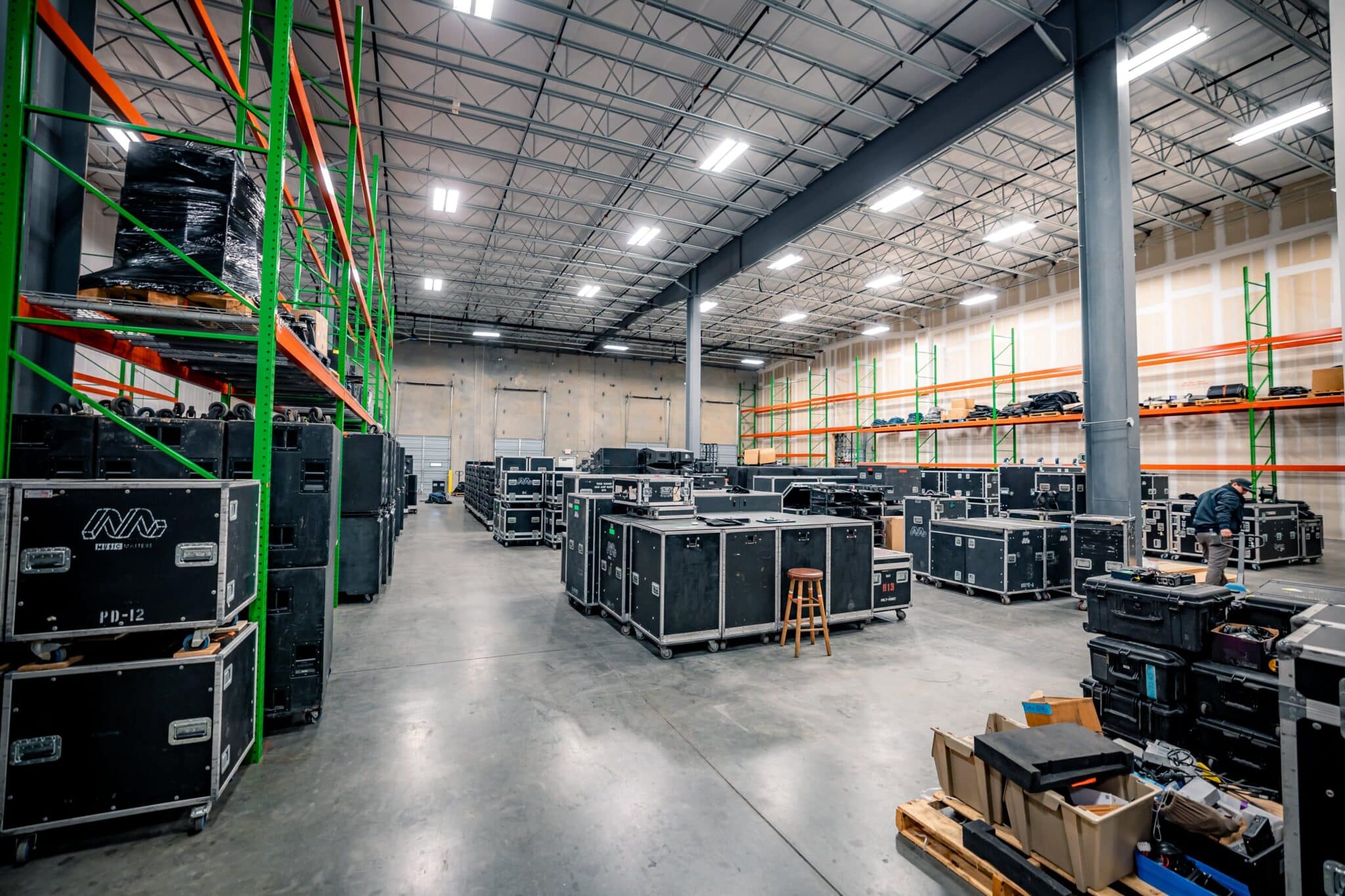
Company adds 20,000 square feet to meet growing demand
Music Matters Productions (MMP), a premier provider of audio, lighting, video, staging and rigging solutions, has expanded its metro Atlanta headquarters, increasing the total warehouse footprint from 40,000 to 60,000 square feet.
In addition, MMP has opened a second 10,000-square-foot building directly across the street to house its growing corporate production division.
The expansion comes in response to increased demand across touring, festival and corporate markets, as well as the continued growth of MMP’s high-end gear inventory. With a fully dedicated shop for each department, including audio, lighting, video, rigging and staging, the new layout provides more space for show prep, pre-rigging and crew coordination, allowing for even more efficient load-ins and streamlined execution.
New features
The rigging department now features a new mobile motor hoist test stand, allowing for in-house motor certification, a service that’s now available to external clients in the production community.
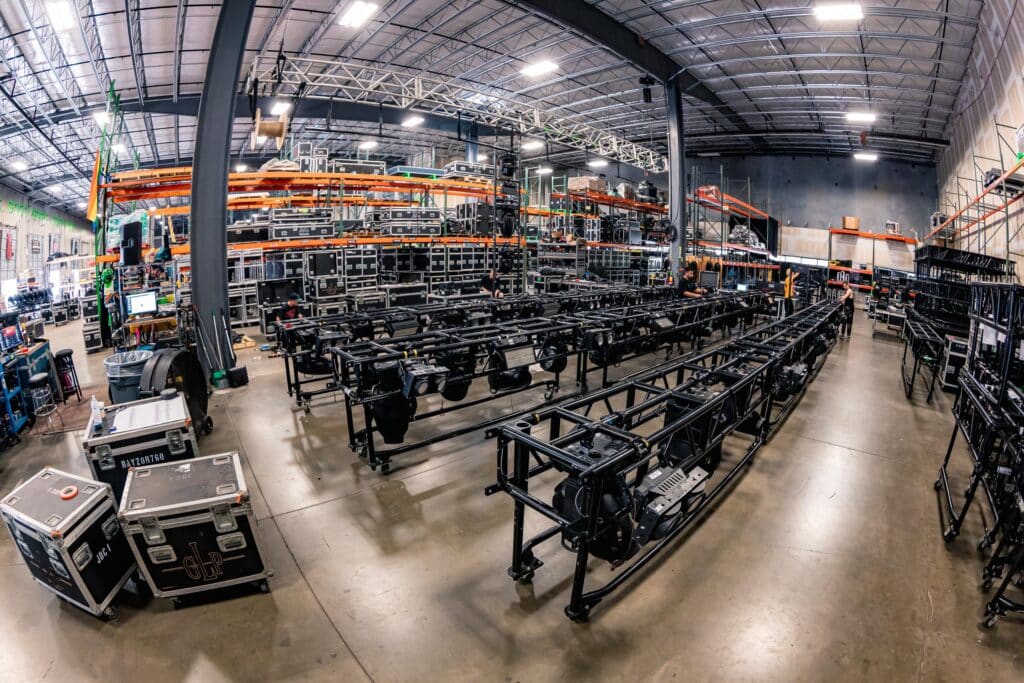
Five new truck bays were added in the process, as well, bringing the total number of bays to 17 — an important upgrade for MMP’s fleet and the increasing number of shows moving through the warehouse each week.
“This growth is a direct reflection of the work our team puts in and the trust our clients place in us,” said Aaron Soriero, owner of Music Matters Productions. “We didn’t expand for the sake of being bigger, we expanded because we needed the space to do the job right. More room means tighter prep, faster turns and better support for our clients.”
Expanding operations
The expanded warehouse and building across the street include additional offices, mixed-use areas and a dedicated repairs department, giving the team more capacity to prep, collaborate, QC and scale for increasingly complex events — both corporate and entertainment.
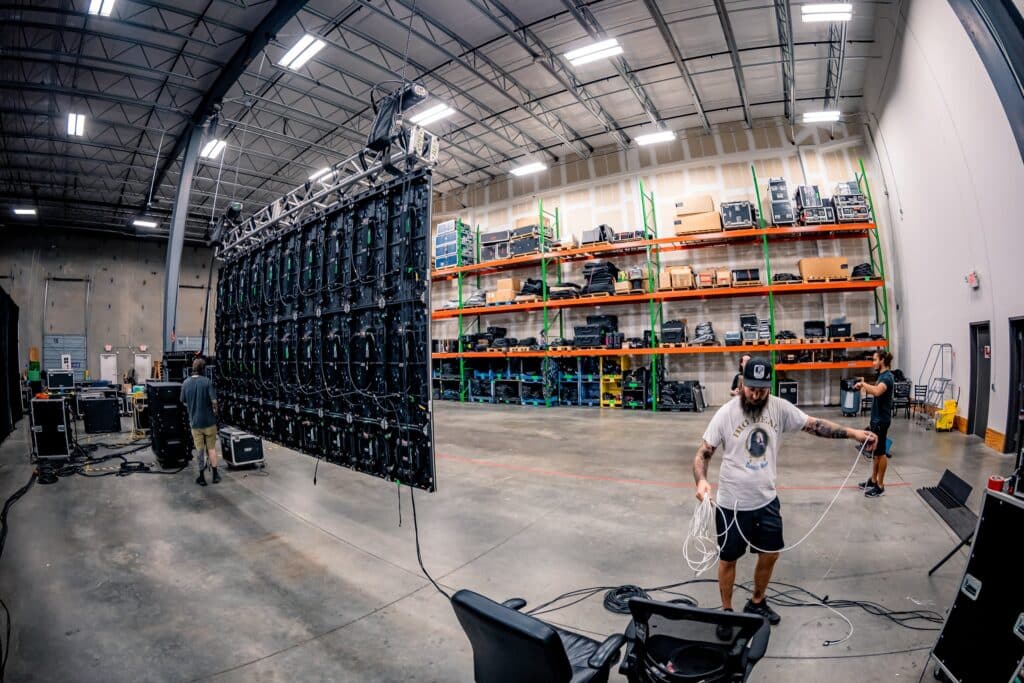
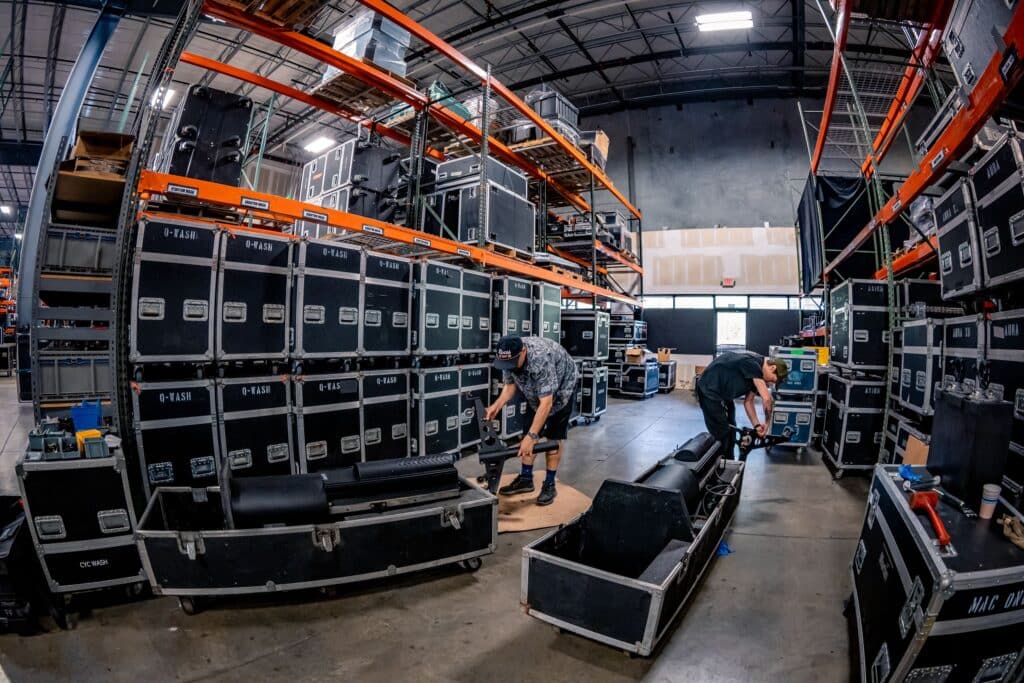
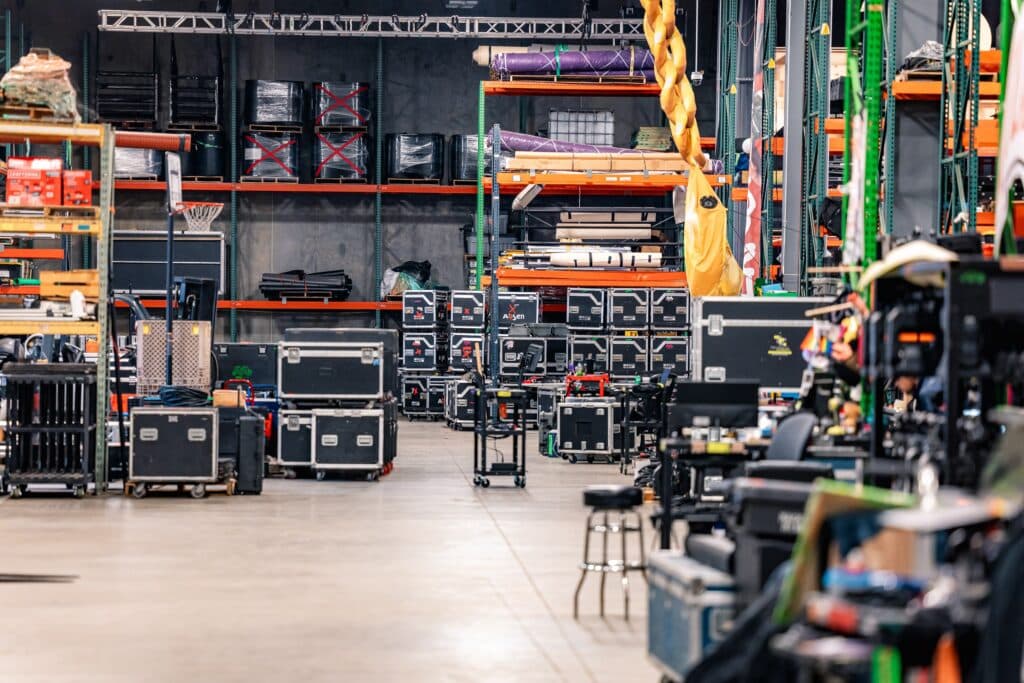
With a reputation built on reliable gear, experienced crews and an enhanced client experience, MMP continues to solidify its role as a go-to production partner for events of every size and setting — whether it’s a beachside festival, a stadium tour, brand activation or a high-stakes corporate show.
About Music Matters Productions
Music Matters Productions is a full-service live event production company based in Peachtree Corners, Georgia, providing industry-leading audio, lighting, video, rigging and staging solutions for tours, festivals, brand activations and corporate events across the country.
Known for its high-end inventory, seasoned crew and deep dedication to doing the job right, MMP supports hundreds of productions each year and is trusted by clients nationwide.
For more information, visit mmp-atl.com.
Related
Business
From Boardrooms to the Himalayas: Vandana’s Journey to Purpose and Growing with Intention [Podcast]
Published
2 weeks agoon
May 19, 2025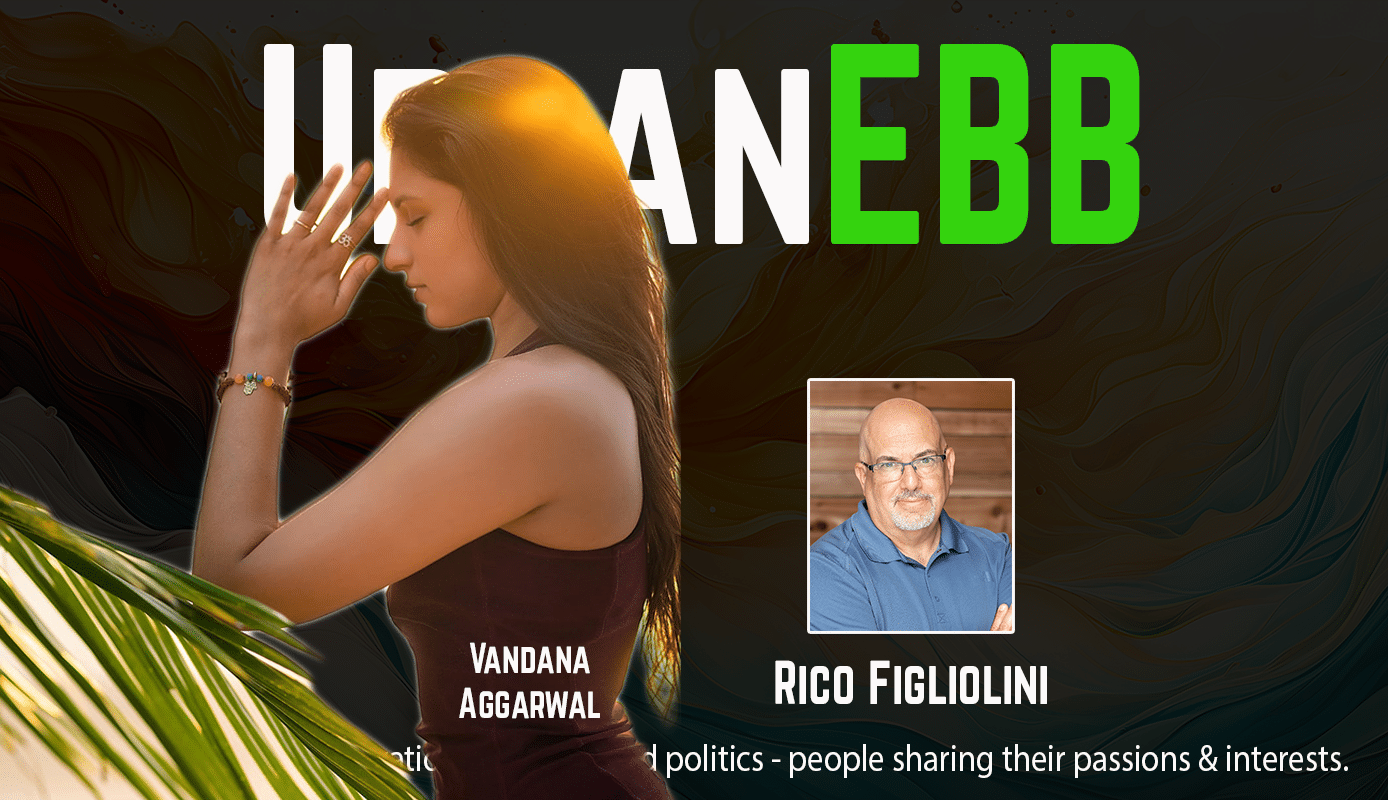
How one family blends operational clarity, conscious leadership, and community-driven values to grow their business — together.
In this episode of UrbanEbb, host Rico Figliolini chats with Vandana Aggarwal, VP of Operations at Aggarwal Real Estate, about the winding road from global consulting to family-run commercial real estate in Norcross, Georgia. With honesty, warmth and insight, V shares how she went from working 80-hour weeks in corporate strategy to rediscovering clarity in the mountains of India — ultimately helping transform her family’s business into a community-driven real estate firm managing over 50 shopping centers.
The conversation weaves together themes of leadership, legacy, operational excellence and the transformative power of both AI and yoga. It’s a story about clarity, courage and conscious growth — both in business and in life. This is another episode you won’t want to miss.
Episode Highlights
- Why Vandana left a high-powered consulting career to join her family business
- How hiking Kilimanjaro and studying yoga in the Himalayas changed her leadership mindset
- The operational overhaul she brought to Aggarwal Real Estate to support growth
- What it’s like working side-by-side with your dad, siblings, and 700+ tenants
- How the company rebranded with intention and built a mission around “building communities as a community”
- Where AI is reshaping real estate—from lease drafting to property management—and where it still can’t compete with people
- Leadership succession planning with siblings at the helm
- The importance of clarity, calm, and conscious growth in both business and life
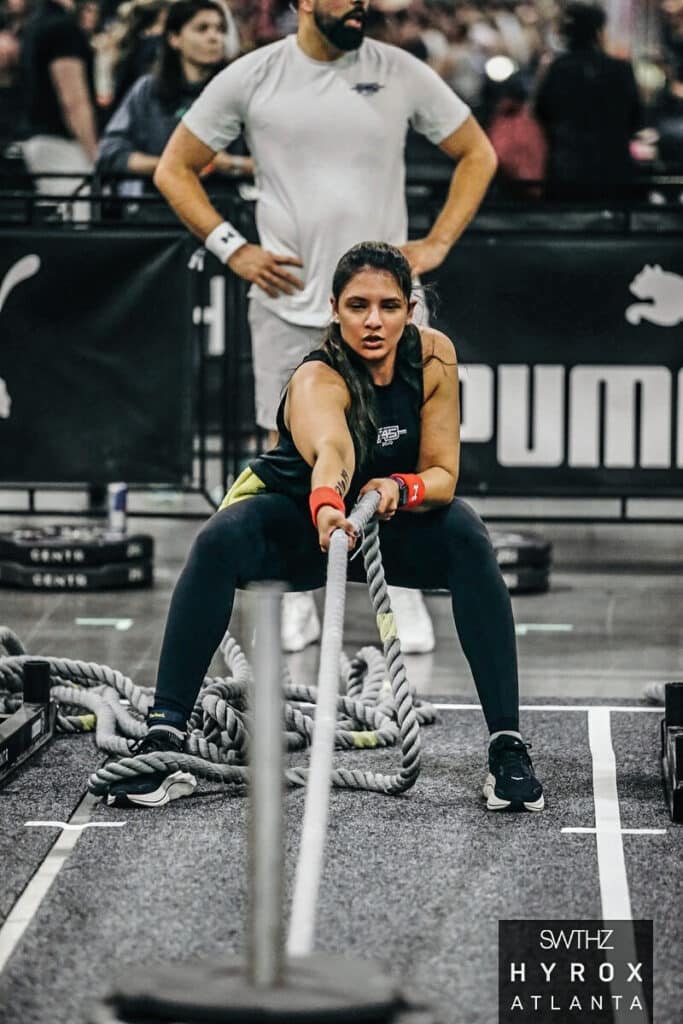


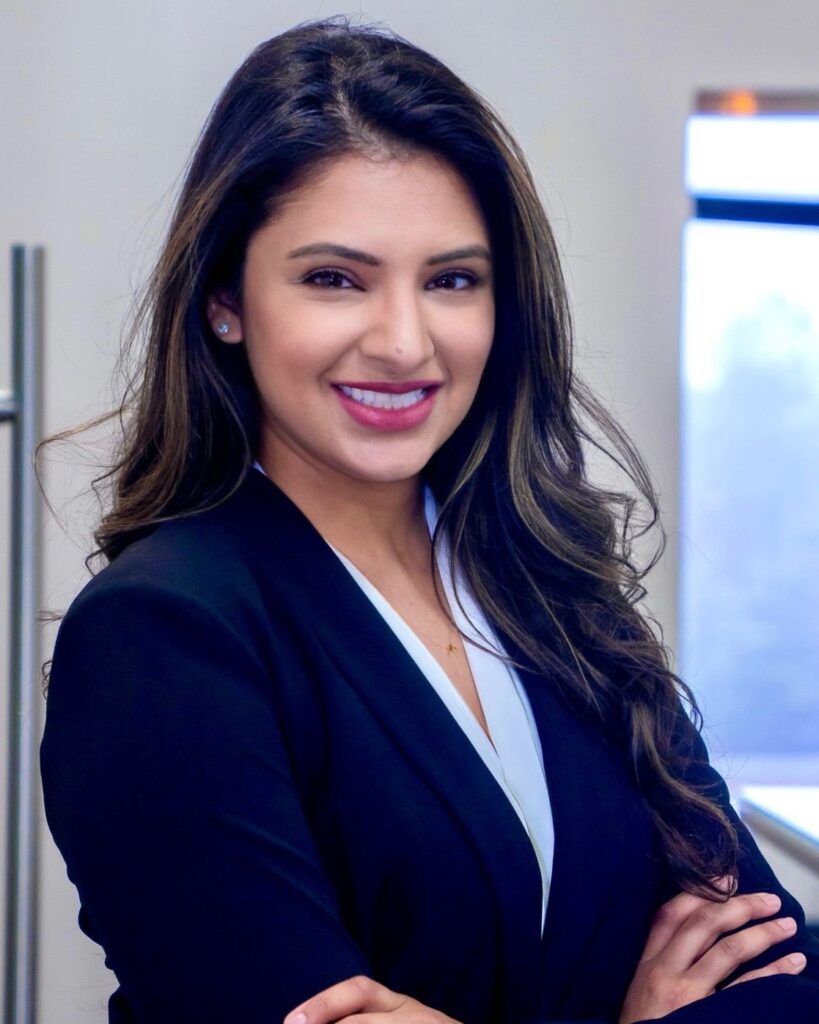




About Vandana Aggarwal
Vandana Aggarwal is the Vice President of Operations at Aggarwal Real Estate, her family’s commercial real estate investment and management firm. She brings a unique blend of strategic insight and operational excellence, shaped by her early career as a consultant at A.T. Kearney, where she advised Fortune 100 to 500 companies. A graduate of Georgia Tech, she also took a transformative detour from the corporate world to spend a year in India teaching yoga—an experience that continues to influence her leadership style today. At the core of her work is a deep commitment to family and a passion for building strong, connected communities.
Timestamp:
00:00:00 – Introduction and sponsors: Vox Pop Uli & EV Remodeling
00:03:12 – From Georgia Tech to global consulting
00:04:23 – Leading strategy for Fortune 500 companies
00:06:11 – The role of vision alignment at the C-suite
00:08:01 – Sabbatical becomes family business overhaul
00:09:35 – Bringing operational excellence to a growing real estate firm
00:12:02 – A year of yoga, nature, and healing in India
00:17:03 – Hiking Kilimanjaro, testing limits, and expanding self-trust
00:18:52 – Navigating family dynamics inside a business
00:21:56 – Planning for leadership transition: siblings, strategy, succession
00:24:06 – Rebranding the business: from American Management to Aggarwal Real Estate
00:26:33 – Where AI fits (and doesn’t) in real estate operations
00:30:04 – Legal, leasing, HR, and marketing efficiency with tech
00:31:01 – Community-focused retail and experiential shopping centers
00:32:00 – Reflections on AI, journalism, and digital trust
00:32:57 – Closing thoughts
Podcast Transcript
00:00:00 – Rico Figliolini
Hi, everyone. This is Rico Figliolini, host of UrbanEbb. This podcast comes out of the city of Peachtree Corners, and we have a special guest today. And if I don’t mess up the name, it’s Vandana Aggarwal.
00:00:15 – Vandana Aggarwal
Absolutely. You can call me V, Rico.
00:00:15 – Rico Figliolini
I’m going to call you V, trust me. And I’m Rico Figliolini, so a bit of a long name there. But V is VP of Operations of Aggarwal Real Estate here, based in Peachtree Corners? No, Norcross.
00:00:30 – Vandana Aggarwal
In Norcross, yeah. Norcross, Georgia.
00:00:32 – Rico Figliolini
Yeah, yeah. Just off 85, and?
00:00:34 – Vandana Aggarwal
Jimmy Carter.
00:00:35 – Rico Figliolini
And Jimmy Carter.
00:00:36 – Vandana Aggarwal
We’re completing each other’s sentences already.
00:00:39 – Rico Figliolini
But where are we doing this? We’re doing this from one of our great sponsors, one of our two great sponsors, Vox Pop Uli. Was this tastefully obnoxious? Let me tell you, I asked them to do a corner cut for us, and this is perfect. So they have the Moxie logo and stuff. So they’re branding, right? Same way they can brand your stuff. They’ll put your logo on anything. They’ve done, I think, 6,000 vehicle wraps. They’ve done garments, obviously. They could do one-offs or they could do 1,000. They do trade show booths, wraps, everything. So anything you need a logo on, think of what object you want it on. They’ll figure it out for you. And if you’re doing, let’s say, 5,000 mailers and you want that database customized for each postcard, they could do that also. It’s called data. I forget what it’s called, but they can do that. They can work the data into the printing as well. So all customizable. Check them out, voxpopuli.com. Now, getting to something we were talking about, hands-on stuff, which is this also. This can’t just be done by machines, right? Although machines, you still need people. But EV Remodeling Inc., they are a remodeling company. They can do design to build. They can do whole house renovation. They can create your deck, your backyard gazebo. They can put a bathroom, kitchen, anything you want. EV Remodeling Inc. is owned by Eli and his family. Lives in Peachtree Corners. It’s based out of our city. They’ve done, I think, over 250 homes recently. So check them out, evremodelinginc.com. And I want to thank both of them for being great sponsors of ours. So, it’s always a long stretch doing that, but I’m glad to have you, V.
00:02:22 – Vandana Aggarwal
I’m happy to be here. Thank you for inviting me onto your podcast. Excited to chat with you.
00:02:25 – Rico Figliolini
Yeah, no, this is cool. Well, you know, I met you, where did I meet you at? I think it was the chamber.
00:02:30 – Vandana Aggarwal
Yeah, the Southwest Gwinnett Chamber event.
00:02:32 – Rico Figliolini
Yeah, and we were talking a bit, and I was like, damn, you know, I had my father owned a business, and he wanted his kids to be in it. None of us, none of us could go into that business. It’s a little difficult, different industry. It was a hard industry, plus my father was very patriarchal, very over-demanding. God bless him. He mellowed in age. But when you were telling me about your family, I mean, your father, your mother, your sister, your brother, and you, I mean, all in it. It’s amazing.
00:02:55 – Vandana Aggarwal
We’re all together. We’re the modern-day Brady Bunch.
00:03:03 – Rico Figliolini
I love it. Yes, that’s exactly it. But, let’s start a little bit. I mean, you were telling me, I mean, you came from a consulting world. You came where you were actually being paid a lot more than you’re being paid right now, actually.
00:03:12 – Vandana Aggarwal
I told my father he couldn’t afford me when he recruited me out. So I graduated from Georgia Tech in 2007. I actually did join his company right out of college for two years, learned a lot about the company. He actually had me go through a rotation in every department of the company to learn more about what we did, how we operated. And I think very quickly, it was also 2008-9 with a recession. But I was also very interested to learn how big companies operate. How can you take a small company at that time? We were much smaller than we are today and really understand how do you go from this, which is where everyone starts, right? As a new company to get to be one of the largest in the nation, in the world and see how they operate, how they grew it from, you know, a mom and pop business to this global enterprise. Consulting was a natural transition to learn about multiple companies, multiple industries. So transitioned into AT Kearney, which has now been rebranded as Kearney, and out of their Chicago office. So I was there for seven to eight years, almost eight years.
00:04:23 – Rico Figliolini
Entry-level position you got in?
00:04:24 – Vandana Aggarwal
Yeah, I went in as an analyst. The good thing with that experience was by the time I left, I was a senior manager with Kearney. I worked across 17 different companies in those eight years. So I got to experience how CPG companies, retail companies, transportation, IT, you name it, I’ve done it. In terms of the different types of industries I got to work with, worked with a lot of Fortune 100 to 500 companies at the C-suite level. So we were coming up with all kinds of strategy projects such as new market entries, mergers and acquisitions. A lot of what I ended up specializing in in those seven years was operational efficiency and growth strategy. So it was an amazing, I’m grateful for that learning experience, the you know the caliber of minds that you work with. You also get to experience what the C-suite looks like. How does the very top operate and then it goes from the top down right? So it is very much led at this very top leadership and you see how companies change in their culture the way they operate based on how the top is designed.
00:05:38 – Rico Figliolini
So did you see good and bad at the top?
00:05:41 – Vandana Aggarwal
Absolutely. And I’m not going to name names. But you learn a lot when you see how your CEO and your C-suite right below them, the culture they’re bringing into a company and their vision and their goals if they’re aligned, unaligned. Anyone that at the very top have different viewpoints of where the company has had it is where companies start to break apart, lose revenue, lose their you know people, which is very important.
00:06:11 – Rico Figliolini
Where did you see the pain point then? What was the common denominator I guess of those?
00:06:18 – Vandana Aggarwal
There’s no one common denominator, but if I had to kind of narrow in, it comes down to what is our five-year, ten-year trajectory? Where are we headed? As large companies grow, you’re not just in one industry. You’re not just doing retail shopping centers. You’re investing in all kinds of properties just to bring it back to our company. Similarly, a CPG company can make all kinds of products, so they have to decide what it is because you have to be concentrated on the right places. If you have a leadership team that is in alignment of what that ultimate goal is, right, then you have clear strategies and, you know, metrics you’re measuring your success against. So that was a big thing that I learned. Also just, you know, seeing how great leaders operate, right? Some of the best in the nation today, I got to be in the room with them and just to see how they lead is very important.
00:07:14 – Rico Figliolini
Did you see any family dynamics in any of those businesses?
00:07:20 – Vandana Aggarwal
No. You know, there may have been like a father-son duo, but when you’re looking at the very top, I won’t say it was like all in the family, right? You know, and it also becomes the size of a company, right? You know, when you get to an international scale, you’re not always blessed that every person in your family has the right skill set and experience to fill each role on that C-suite.
00:07:46 – Rico Figliolini
I’m just thinking Trump for some reason. Every kid has a job.
00:07:51 – Vandana Aggarwal
Every kid has a job.
00:07:52 – Vandana Aggarwal
You had the accent, right?
00:07:54 – Rico Figliolini
Pretty much, I guess. So after the C-suite or expansion, you traveled a lot too, I think, right?
00:08:01 – Vandana Aggarwal
I did, yeah. So after my seven, eight years in consulting, I was reaching 30. And Shiv, my father, came to me and he said, you know, you’re doing this for a lot of outside companies. Why don’t you help us grow and bring your expertise home? And I said, look, I’ll take a sabbatical. Let me assess the company. And after that period where I took a short sabbatical to come look at how we were operating, I said, I can give you three years. I said, you can’t afford me, but I’ll give you three years of my time. And I said, I think it’ll be the right, it was the right time in the company. We were investing very heavily. We were bringing in a lot of new square footage into the company, and we weren’t designed to manage it. So we as a company, as you know, we are the investors. We have an in-house management company, an in-house leasing company. So as we acquire new properties, our team does the management for those properties in-house. We don’t provide third-party services today. And we do the leasing in-house. But at that time, when he, you know Shiv started we had one or two and now we’re at 50 shopping centers plus and other investments that we have. And there’s a very different way you operate you know and how do you how does the CEO go from being an operator to where he’s overseeing it, but he’s not into the weeds right? So he has create a system for that to happen right? You have to have standard operating processes for your property managers, your accounting team, your marketing team.
00:09:35 – Rico Figliolini
And you quite didn’t have that before.
00:09:37 – Vandana Aggarwal
We didn’t, no. And, you know, and I think that’s why he wanted to bring me in is because my strength is operations and I love it. I love going into messy places and cleaning them up.
00:09:49 – Rico Figliolini
Is that what you did when you were a consultant?
00:09:51 – Vandana Aggarwal
A lot of what I was concentrating on at the end of my consulting career, yes. So I did a lot of operational efficiency work. So we’d go in, assess the way companies were designed. And we’d interview hundreds of team members to understand what their role is. You know, what are they responsible for? How are they delivering? What are they measuring for success? And then we’d redesign the way they did that based on, again, bottom line, what are your ultimate goals for the company?
00:10:21 – Rico Figliolini
So you had to understand that before you got to that point. And you’re not making the decisions, the C-level.
00:10:29 – Vandana Aggarwal
Present, right? And similarly even with Shiv, when I first joined, I said, look, this is how I think we need to redesign the company from a bottoms-up perspective based on ultimately our goal of growth, doubling, tripling in size over the next ten years. And I think this is where the father dynamic came in. I guess he trusted me. And he said, do it. He just said, do it. And it was beautiful because right when you’re with large companies, it’s a lot of time before you get. Those decisions made and that trust, right? And so it was great. And he said, yeah, just put it into place.
00:11:07 – Rico Figliolini
See, that’s a great dad, actually. Some dads would be like, I don’t know about that daughter or son or whatever.
00:11:16 – Vandana Aggarwal
It did take time, though, like to ultimately, he was in the operation so heavily. And, you know, until today, I’m still like, step up, step up. Like, I need you to not get into the weeds. Like I think at that time we had tenants calling him, maintenance guys calling him. Like every little and big problem would go through his cell phone. I said, you’re too smart and you’re such a good investor. This is not your skill set. You shouldn’t be managing this. You need to bring people on who are expertise in this area. And I said, you need to be focused on like the larger plan.
00:11:51 – Rico Figliolini
This way you can grow it better.
00:11:51 – Vandana Aggarwal
Which I think has been very successful over the last eight years I’ve been with him now.
00:11:57 – Rico Figliolini
So before you got to him, though, you were traveling a bit internationally as well?
00:12:02 – Vandana Aggarwal
Yeah, yeah. So this is an amazing year. I was very burnt out. By the time I left consulting, I was working 70 to 80-hour weeks, traveling Monday through Thursday, if not more than that, of the week. So I told Shiv, I was like, I’m going to take a month. I’m going to go to India, get my yoga certification. No intention to teach at the time. I just said it’d be a great one-month retreat. And I was up in the mountains like Himalayas and India in a city called Dharamshala. Beautiful place. One of my favorites in the world. And I just, I think I needed it for myself emotionally, mentally to take that break. So I turned one month into one year. I didn’t know it was going to be a year.
00:12:49 – Rico Figliolini
In that same city? In that same town?
00:12:50 – Vandana Aggarwal
Yeah, so I ended up the school that I had gotten my certification with. I asked them, I was like, do you mind if I hang around for a little while? Like very casually, I’m like, you know, I’ll pay for my room and board, but I just want to be around this group and this energy. And they said, well, if you’re going to be here, why don’t you intern? And they’re like, room and board is free if you intern. I was like, sure. You know, not thinking what it was leading to. This is like that beauty of the universe coming into play. Yeah, so I started teaching, ended up loving teaching. So then I ended up teaching the 200-hour yoga training course. And I was in Dharamshala for four months. And then I moved down to Goa, their Goa campus for another six.
00:13:30 – Rico Figliolini
Where is that? Goa?
00:13:32 – Vandana Aggarwal
Goa? It’s in southern India on their west coast. It’s a beach town. Yeah. So I had the mountains and the beach. But I’m a mountain girl. I’m a hiker. But no, it was a beautiful experience. Very different from anything I’ve done with my career, right? But I became a yoga teacher for a year.
00:13:52 – Rico Figliolini
Did that clear your head? Yoga, they say, can do that, right?
00:13:53 – Vandana Aggarwal
Yeah, it’s all the tools of yoga, right? The meditation, the breath work, really getting internal, going in, right? Just going inwards, being quiet, which we don’t have. We have a lot of noise in our life today, you know? And naturally, right? Between family life, work life, social, and then just all of the noise from everything else right? Like we’re sitting here and I can hear the cars right? So you know that difference was when I was sitting there, I could hear the ocean waves and so there’s something very healing in nature naturally. So it was the tools mixed with nature and I still think nature has a very strong healing power on us. So whenever I can, I try to get out on a mountain and by the ocean. But yeah no it was it was a beautiful experience but it did bring a level of calmness into the way I approach things. It changes your perspective of you know at the end everything’s okay. No matter what you’re going through it’s temporary you’re, and everything that’s happening to us is happening to us for the good. We don’t know it, sometimes it seems like a bad situation in the moment, but ultimately you know, universe, God, whatever you believe in is at play to bring you something better in your life. And you just have to step back to understand what is it delivering us.
00:15:19 – Rico Figliolini
I like the way you think. My wife every once in a while would say, aren’t you upset about that? I’m like, I think come tomorrow, it won’t mean anything. There’s no point in, just relax. Not everything, two days later, it’s not as important as it seemed at that moment.
00:15:37 – Vandana Aggarwal
Yeah. And it’s not just that it’s not as important. It’s also like…
00:15:41 – Rico Figliolini
In perspective?
00:15:42 – Vandana Aggarwal
It’s, what am I gaining from this? Like, what can I gain from this? Oftentimes when, you know, a lot of things happen, yeah, like you get hurt or, you know, it’s like in relationships, right? Or if you have a bad business deal, right? It’s like, hey, how am I growing, right? And I think that’s what makes life very exciting, right? Otherwise, if you’re always living on a high, is it a high?
00:16:06 – Rico Figliolini
Yes. So I’m thinking you were a consultant for seven or eight years. 80 hours a week. And all of a sudden you’re doing yoga on the mountains of India. It’s just like, it’s almost like a movie. It’s almost like…
00:16:18 – Vandana Aggarwal
Eat, pray, love?
00:16:19 – Rico Figliolini
Yes.
00:16:20 – Vandana Aggarwal
It was my eat, pray, love moment for a year.
00:16:23 – Rico Figliolini
That’s amazing.
00:16:24 – Vandana Aggarwal
No, you meet amazing people, but I think we were meant to meet everyone that we come in interaction with on a daily basis. You naturally have a connection. There’s a universe at play, and we were meant to cross paths and learn something from each other, gain something from one another, give to the other person. And I think you just have to look at life that way.
00:16:48 – Rico Figliolini
I definitely think along that way. I mean, I definitely think each of us nudges each other in a crowd a little bit. That one nudge can set you off going in a different direction. So I totally believe in that. So you joined your dad. Yes. And you’re, so actually, even before we get there, so yoga, but what other interests have you been?
00:17:03 – Vandana Aggarwal
Yeah. So, I mean, I’m an avid hiker. I’ve done recently in the last few years, I’ve climbed Kilimanjaro. I did the Machu Picchu trail. I’ve done a few 14ers out in Colorado, but I like to test myself physically. You know, just, again, it comes down to how do we find that push within us past our comfort zone? So is this a physical inability or is it a mental constraint? So to get past that mental constraint of discomfort and then really push yourself to the next level and say, I can achieve something. It’s not going to be easy. So to me, if I’m on a hike and it’s not hard, I’m like, well, was it a hike? Like it didn’t test me, but no I think, you know.
00:17:55 – Rico Figliolini
You should do the Appalachian Trail. That’s like 2000 plus miles.
00:18:03 – Vandana Aggarwal
I know. And it is, you know, it’s not just like the hiking part. It is like living out in nature and, you know, sleeping in uncomfortable conditions. Yeah. Walking in the rain. It’s cold. I think the last day of our Kilimanjaro hike, it was negative 20 degrees up in the mountain and my eyelashes were frozen and I couldn’t feel any part of my body. And, you know, and it tested my breathing. And there is that element of push yourself to the point that it’s not your ego anymore. Like if your body’s saying stop, you have to stop as well and respect your body. But yeah, to really test yourself.
00:18:38 – Rico Figliolini
To circle all that back now, you’re back home. You’re working with your father and your family. A lot of businesses grow or die because of family. If it’s a family business, right?
00:18:52 – Vandana Aggarwal
Absolutely, yeah.
00:18:53 – Rico Figliolini
So you have your highs, your lows, your, sometimes you don’t get along. Sometimes decisions are split. People get upset with each other. So you’ve been at your highs and lows physically and mentally doing other things. Has that helped you in some ways? Not that you’re having a bad time with family. Because it sounds like you all fit just fine, like the Brady Bunch.
00:19:15 – Vandana Aggarwal
Let’s keep it that way. No, I mean, there’s multiple dynamics at play. It is a family business. My father is also my boss. My siblings are also my friends and my coworkers. And it’s about no matter how hard you try, you cannot separate those relationships. There is an interplay of all of it when you spend eight to nine hours a day together. But we all have, again, a common goal for the company. And then a common goal for our personal relationship. So when we sit down, we keep in mind that we like each other and we want to keep it that way. Like very simply put, that’s first and foremost for me especially. Even when Shiv had brought me in, he said, oh, can you manage everyone? And I said, I’ll manage everyone but my brother and sister. I said, you know, like I won’t jeopardize the relationship I have with them as a sibling by being their manager. Especially because I said that’s your job like good luck. But not just that it’s you know we all have different skill sets so I said how do I manage my brother who is a genius he’s a CPA by trade you know like I can’t tell him how to run the financials of this company like he’s supposed to teach me that right? And same way I teach him that. My sister has a master’s in marketing right? She is by far the most social, likable person you’re going to meet, and she knows how to work with people. I said, she needs to teach us that. So I think we’re lucky that each of us, and this is, I think, rare, where you have three kids and each one of them has their own skill set. That, I think, helps us stay in business and we see ourselves foreseeably into the long-term future being in business together is because we each bring something very unique to the table. Ultimately we value the relationships that we have on a personal level as a family above all else right? And then you know the element of like, how does the yoga experience a hiking experience teach us. That’s, it’s not specific to anyone’s situation, I think it’s a baseline of who you become right? The foundation. Like it teaches you patience, it teaches you again, everything is temporary so let’s not get overly attached emotionally or get upset or too joyful, even like, let’s just stay neutralized on any situation because it will end. And then the next one will come up and kind of flow with the ebbs and flows of the ocean. You, you flow with everything that comes with you, comes your way at work, at home. But yeah, I mean, we do sit down as a leadership team. I, my father and my siblings and I, and we talk about, hey, we separately do the exercise. Where are we going to be in five years? What role do we play in that journey? And thankfully, all of ours are very similar in what our goals are. And then we have different skill sets that we bring. So even as we design the future of the company in a moment where my father is not at the head of the table, we’re working on that redesign work. But it’s very conscious. It’s very intentional. Again, we all step back and say, hey, look, how do we maintain, how do we solve problems? Because like, you know, we were talking about how tomorrow we may not agree on something, a big decision. What are we investing in? Come back to, you know, right now Shiv gets to make an ultimate decision because he’s the one leader at the top. Tomorrow it’s going to be three people at the top. How do you deal?
00:23:04 – Rico Figliolini
So is there an exit plan for your dad? Well, not an exit plan.
00:23:09 – Vandana Aggarwal
Not an exit plan. He already has. I think he, you know, he’s gone from, he’s the hardest working person I know. I get that from him. We’re addicted to work.
00:23:18 – Rico Figliolini
80 hours a week.
00:23:21 – Vandana Aggarwal
We love working. You know, this company is his baby. I think I’ve adopted it at this point and we all have. But, to stay mentally sharp, to stay alive, you have to keep working. You have to keep doing something. You have to be working towards something that brings you joy and purpose. And I think, you know, he stepped back to take time towards a lot of his nonprofit work, community work that he’s very much engaged with. But he’s still at the top. He’s still running, you know, his, you know, he’s, you know, not slowing down. You know, we’re constantly growing. We’re growing this year in a large scale, which is amazing, and he’s leading that charge.
00:23:59 – Rico Figliolini
How many properties do you own?
00:24:02 – Vandana Aggarwall
Today we have 50 shopping centers and then a few other assets.
00:24:06 – Rico Figliolini
Is that like 3 million square feet or something? 4 million?
00:24:10 – Vandana Aggarwal
Yeah, over 700 tenants. But, you know, when we sat down a few years ago, we rebranded. Aggarwal Real Estate didn’t exist until two years ago. It was American Management Services. And we had a rebranding effort because we said we want the company’s name and the brand to represent who we are.
00:24:33 – Rico Figliolini
I like that, by the way.
00:24:35 – Vandana Aggarwal
Yeah, it needs to mean something. And we were also proud of what our father has achieved, right? He’s given us this beautiful life that we get to help grow upon. So we said it needs to pay homage to him. So we said, let’s make it Aggarwal Real Estate, ARE. And then as we were deciding what that vision is, we’re a family. In the company, we are a family, not just the four of us, but all of our staff, our team. We don’t, you know, we don’t look at them separate from who we are. And so we said our mission as a company is building communities as a community. And it talks about, hey, in all of the real estate work we’re doing, we try to make sure all of our properties are beautiful. Our tenants are happy. They have direct access to each of us in the company. And on top of that, as a company, we are a community within ourselves because we can’t create them until we are one. So it was very intentional to who we already were, but putting it into brand terms.
00:25:37 – Rico Figliolini
It’s amazing. All that property, tenants. Can’t imagine father tech can send text messages on all their problems, if they have any.
00:25:45 – Vandana Aggarwal
He’s a brilliant man.
00:25:45 – Rico Figliolini
You could be too possessed on that stuff. We want to be cognizant of our time together.
00:25:55 – Vandana Aggarwal
Absolutely.
00:25:57 – Rico Figliolini
So the next subject really was going to be about also AI, because everyone’s talking about AI. We were talking about that before the show started, before we started recording, which was kind of funny because V was asking me if we edit anything. And I was like, no, straight through.
00:26:11 – Vandana Aggarwal
I wanted to see if I could say a few things and then have it taken out of this conversation.
00:26:13 – Rico Figliolini
Nope. Nope. Doesn’t work that way. So, but ChatGPT, AI, that’s all. I mean, you know, could I create a bot to edit this? Probably. But there’s so many things we use in our lives. And you’ve been talking about how it would affect your business. Nevermind the consulting work you did.
00:26:33 – Vandana Aggarwal
Yeah. I mean, the consulting world is, I mean, it depends on the industry, the type of work you’re doing. In real estate, I’ve put a lot of thought behind this. There’s a lot of conversations happening across every industry, every sector, whether it’s education, automotives, real estate, et cetera. Everything’s being discussed. How is that changing the future? How do we incorporate it to be more efficient, right? Be the best in the industry that we can be or operate better. And so for me it’s again comes down to that operations element that I think about like, how do I incorporate it for a company that’s a medium-sized real estate firm today as we become a large company, a bigger player in the market. And people are very important in real estate right?
00:27:17 – Rico Figliolini
Talk about editing?
00:27:20 – Vandana Aggarwal
I was telling you, we should bring them into the podcast.
00:27:27 – Rico Figliolini
We’re going to run a little longer on this.
00:27:36 – Vandana Aggarwal
But let’s take retail shopping centers. This is brick and mortar. I did a paper actually for a large mall retailer back in my consulting days on how the title of the paper was, is brick and mortar dead? And, you know, full circle, I am fully dedicated to brick and mortar, retail, office, multifamily now. But you still need people to clean up your properties, fix your maintenance issues. We were talking about roofing, plumbing, electrical. That is hands-on work. You know, today there is, it’s going to be a long time before there’s a robot that comes in to do that. There will be. I don’t know. I do not see that in 10 years to say we’ve got roofers that are robotic drones that are going to come fix my roof problems.
00:28:24 – Rico Figliolini
Zumbas, they’re going to run around the roof or something.
00:28:26 – Vandana Aggarwal
That’s actually genius. A Zumba for my roof.
00:28:31 – Rico Figliolini
Why not? Attach it to the right thing.
00:28:33 – Vandana Aggarwal
But so those are very people-oriented roles today. Technology will advance how quickly it’s done or how well it’s done. But you’ll still need someone to operate the machinery of it and everything.
00:28:49 – Rico Figliolini
Just not as many.
00:28:50 – Vandana Aggarwal
Yeah. Construction, similarly, right?
00:28:54 – Rico Figliolini
Unless you 3D print a house. I’m sorry.
00:28:56 – Vandana Aggarwal
No, it’s true. It’s true. There’s so many options. I’m thinking 10 years now. I’m not going to have a 3D printer making the metal framing for my new construction project. You know, or installing the sheetrock, it does probably speed up the process, right? There will be machinery to help with that, a lot of AI development in that way. It’s a lot at an office administrative level, right? The speed in which you’re processing invoices, the speed in which you are, you know, getting payments taken in. Today, I would say as far back as right before COVID, we were still accepting checks for money. Now it’s all online. Like we do not accept money coming into the office, or it’s very limited to what we do, right? So that’s AI, if you think about it, right? The ability to pay online.
00:29:42 – Rico Figliolini
QuickBooks Online uses AI now, you can enable it.
00:29:47 – Vandana Aggarwal
So we’ve been using it for many years. The advancement of it has been a little bit slower, and now it’s sped up. Marketing, we were just talking about how you created a flyer on ChatGPT, was it?
00:30:00 – Rico Figliolini
I won’t talk about the student that’s helping us out here and how they use AI.
00:30:04 – Vandana Aggarwal
No, AI in school, right? But yeah, it’s an AI processor for my HR roles, right? Instead of reading 100 resumes, it’s going through the system to filter them out. Whether it’s writing contracts, I won’t lie. Legal jargon is coming out of ChatGPT today. And so it’s speeding up the way we’re doing work. But my legal team probably, and they won’t say it, should be using AI if they’re not. To help create some of this work right? So it’s like these companies are still going to be needed, but the way that they’re able to respond to us at a quicker, everything would just happen faster right? From typewriters to computers, everything.
00:30:49 – Rico Figliolini
Especially if they know that they just did a lease from you for this property in Texas, that we need three more leases done for three other places, it’s not going to be that much different, right? It’s a template.
00:31:01 – Vandana Aggarwal
It’s coming out a lot faster. Yeah, I mean the negotiations, that’s a people-to-people thing right? So I think thankfully in the real estate world we’re still going to need people. We’re still going to need buildings right? The way built, we were just talking about how a retail shopping center is no longer just for shopping. It has to be for entertainment. It has to be for bringing families in and giving them more than just, hey, go into a TJ Maxx and buy something, right? It’s like, what else are you getting when you’re at that center? Whether it’s a play space or events, we’re starting to do more events at our shopping centers. So it’s, again, serving the community.
00:31:39 – Rico Figliolini
We’re seeing that more. More of that happening. We could go on and on here.
00:31:46 – Vandana Aggarwal
Chatting with you.
00:31:46 – Rico Figliolini
Yeah, and we should probably do one on either AI in the marketplace. Or maybe a panel discussion on something similar.
00:31:51 – Vandana Aggarwal
Yeah, overall, yeah. That would be exciting.
00:31:55 – Rico Figliolini
Yeah, I think that would be cool.
00:31:56 – Vandana Aggarwal
I think it’s interesting to learn about kind of where every industry is heading. It impacts all of us.
00:32:00 – Rico Figliolini
For sure. I mean, the magazine business, I mean, it’s all like we have certain, we have AI rules. But, you know, AI is still being used to degree to research things. And to do certain things like that. You know, hopefully journalism isn’t just handed over. They do say 40% of the internet is AI written. So, which is kind of incestuous almost because it’ll just feed on itself at some point.
00:32:27 – Vandana Aggarwal
There’s a whole discussion about the validity and the trust behind digital content. In the next few years. I think it’s going to diminish.
00:32:35 – Rico Figliolini
Oh, yeah. I mean, I’m seeing videos now and it’s just like, it just looks so real. And you could not tell the difference, even voice-wise.
00:32:42 – Vandana Aggarwal
And that’s scary to think. It’s like, how do you trust what you see?
00:32:47 – Rico Figliolini
So on that note, and since this is not edited, so this is right from the beginning. So this is all true. But I want to thank everyone. I want to thank you, V, for being with me.
00:32:57 – Vandana Aggarwal
Thank you so much for having me. This was a great conversation.
00:33:01 – Rico Figliolini
It went by way faster than some of these go. So this is a great discussion. Thank you, everyone. I appreciate you for joining us. Thank you for Vox Pop Uli for the studio look and for letting us do it here, for being a sponsor and for EV Remodeling. Also, I want to thank Jeremy Pruitt behind the camera who has taken care. He’s a Paul Duke student. And it wasn’t him that I was talking about before, by the way. But all the work he’s done on the back end on this. So thank you, Jeremy. So thank you all. Thanks for being with us.
Related
Business
Peachtree Corners Grows Business Opportunities Through Economic Development
Published
4 weeks agoon
May 6, 2025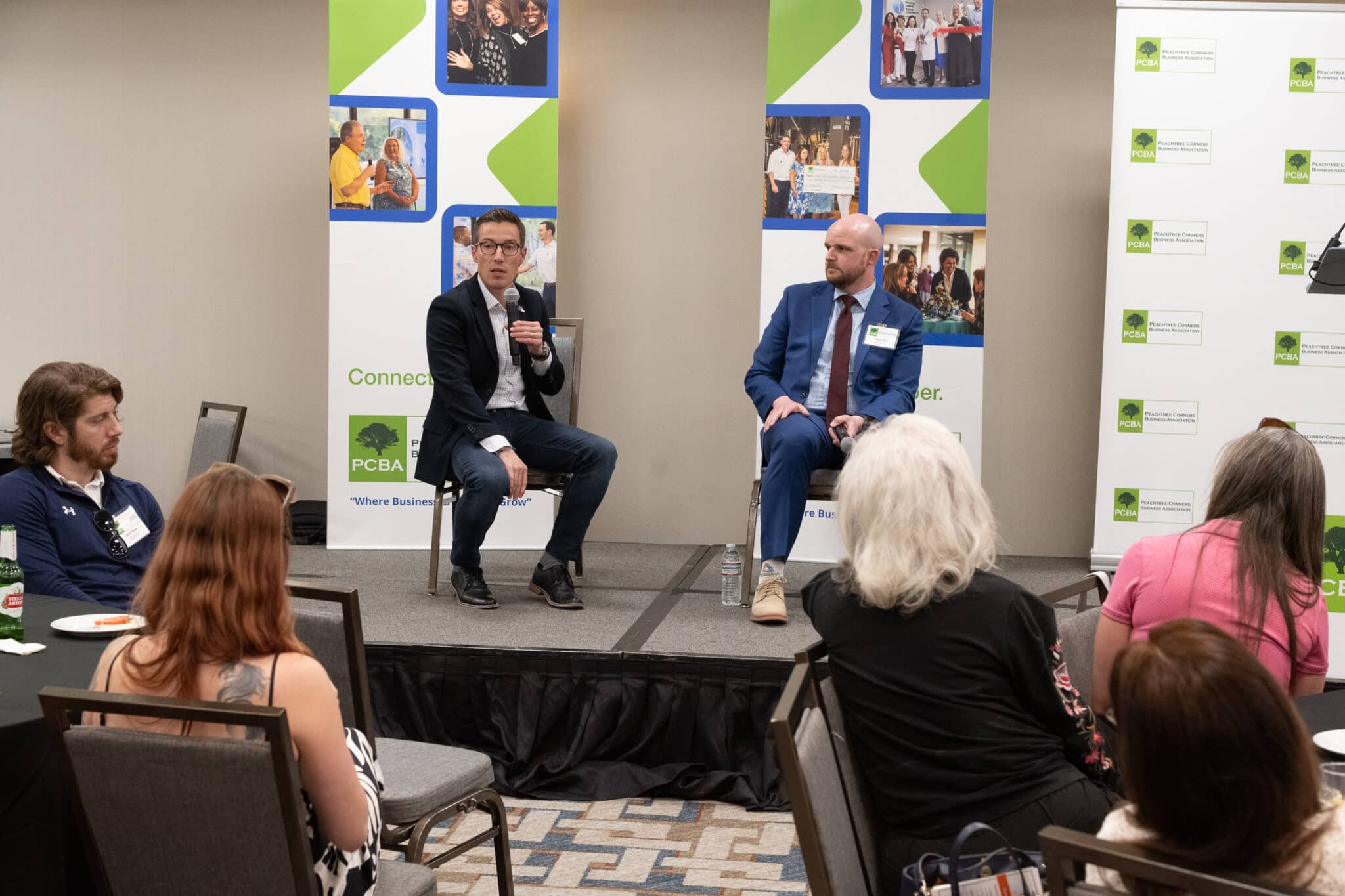
Most residents and business owners in Peachtree Corners probably think they know all about the economic development and strategic planning of Peachtree Corners, but do they really?
Peachtree Corners Business Association invited Peachtree Corners Economic Development Director Betrand Lapoire and Partnership Gwinnett Director of Economic Development Andrew Hickey to its After Hours Speaker Series on March 27 to discuss the city’s growth from a 1971 master plan to a bustling city with 42,000 inhabitants and 40,000 jobs.
Key points included the importance of business retention and expansion, with 24 projects last year creating 1,600 retained jobs, 1,600 new jobs and $250 million in new capital investment.
The Curiosity Lab, a world-class innovation center, was emphasized as a significant attraction. The city’s zoning and infrastructure plans were also discussed, focusing on balancing office and residential development to maintain a vibrant, sustainable community.
Matching jobs to residents
Although Peachtree Corners is just a teenager in terms of being an incorporated city, the foundation for this vibrant, fast-paced economic hub was laid more than 50 years ago by technology pioneer Paul Duke.
“Peachtree Corners was the first master-planned, business innovation technology park in metro Atlanta,” said Lapoire. “It was in response to the brain drain of technology with Georgia Tech graduates leaving the area.”
While the city may have a small-town feel, it’s the largest in Gwinnett County by population, but not land mass, he added.
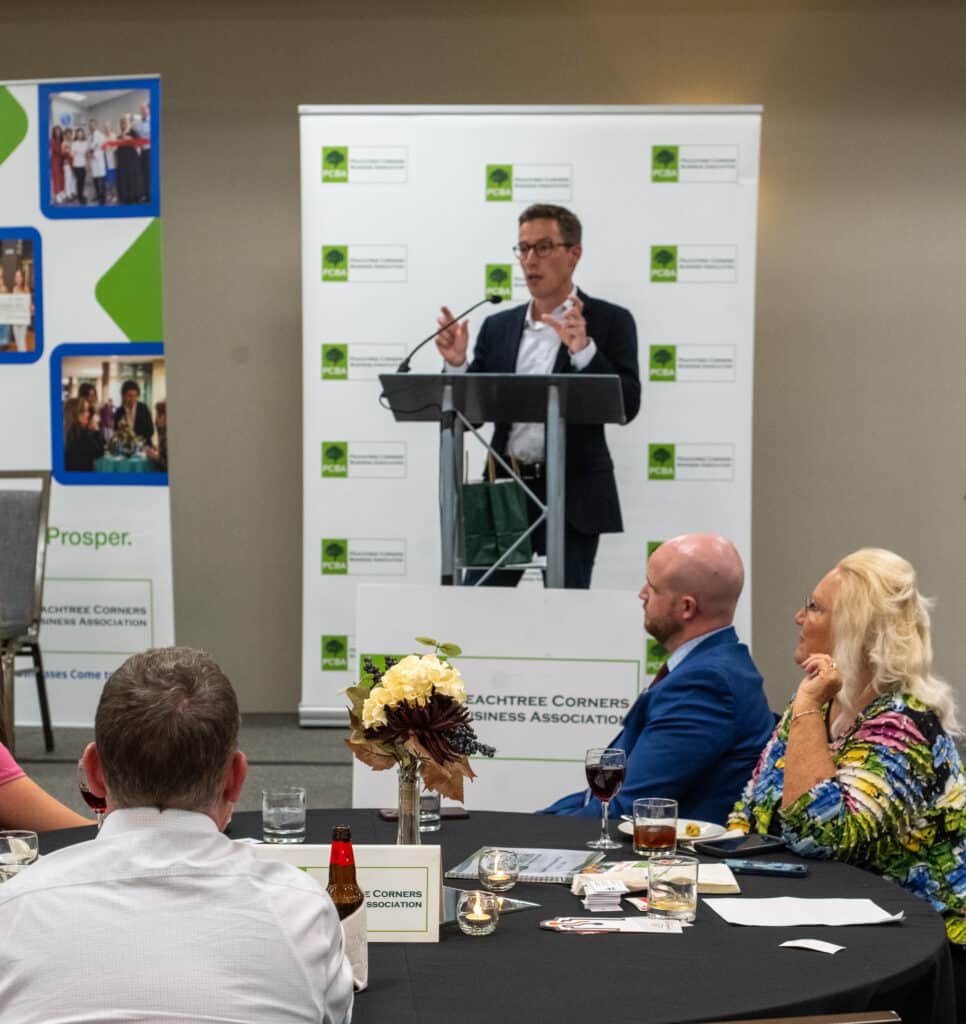
“The city started from a commercial, industrial, R&D base and then was expanded around it,” said Lapoire.
Though home to more than 42,000 residents, most of the jobs in Peachtree Corners are filled by people who live outside the city, he added.
“So we have this interesting mismatch, in a way, although not unusual,” said LaPoire. That creates traffic and transit issues. So that means that one of the solutions is to create more jobs here to fit the profile of the community.”
He presented charts that show professional services, consulting and engineering as the largest job categories. The next tier of businesses are wholesale and manufacturing.
“So we have a good mix of industry,” he said.
A five-year plan
The city has a five-year economic development plan (2023-2028) that outlines strategies for attracting and retaining businesses, with education and workforce development being key components.
Partnership Gwinnett has similar goals as Peachtree Corners, but on a larger scale.
“We are the county’s sales and marketing arm for all 17 cities now, and we receive funding from both municipal sources as well as existing businesses here — both in Gwinnett and outside of Gwinnett as well,” said Hickey.
He shared how Partnership Gwinnett is designed to drive a lot of major corporations toward doing business inside and with Gwinnett County.
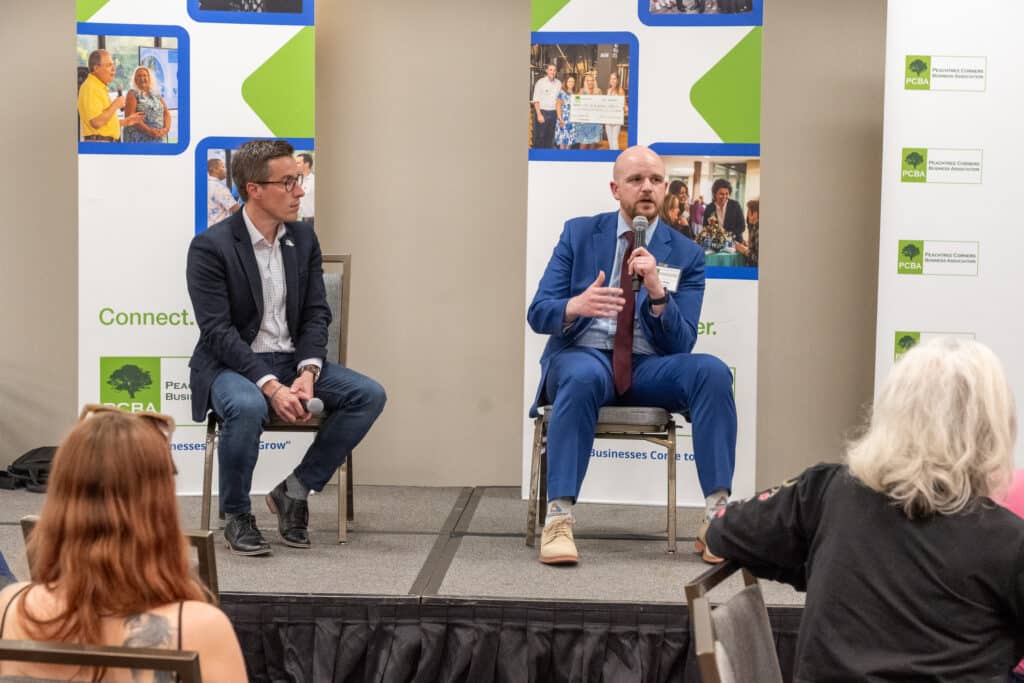
“One of the biggest things that we talk about that I’m sure it seems like most of us here, if you live here, you work here, you understand it. It’s the diversity that exists here in Gwinnett,” he said. “With a diversity index of 85, that means if we walk out of the Hilton here and we say hello to somebody, there’s an 85% chance they’re from a different ethnic or cultural background than ourselves, which to you and I may seem normal because that’s the life that we live in.”
He added that for companies, there’s a tremendous value in that, whether they have stated values, or they’re just making hiring decisions to get a wide range of candidates to fill those roles. Additionally, because of the proximity to Atlanta, Gwinnett County has a great labor draw.
Partnership Gwinnett
Partnership Gwinnett plays a significant role in recruiting businesses, expanding existing companies and developing the workforce. Hickey showed how the organization was involved with more than 24 projects last year.
“A majority of those were expansions, and that is a common thread you’ll see in economic development,” he said. “In business retention, expansion is so vital to working with our existing companies to make sure that they have the resources they need.”
He added that’s what leads to new investment and job creation in the community.
The organization also focuses on redevelopment projects, working with cities and the county to improve infrastructure and community amenities — especially strong educational institutions such Georgia Gwinnett College, Philadelphia College of Osteopathic Medicine and others.
Quality of life
In closing, both men stressed the importance of recruiting companies and developing the workforce, along with one aspect that means a lot but may not be as obvious — quality of life.
“It’s definitely evident that people like to work where they live — the whole live, work play experience,” said Hickey. “I joke that the part that people really have the most questions about, and are most excited to learn about, is new events at The Forum or Gwinnett Place Mall.”
Although they want to know what’s the next major company coming to Gwinnett, people REALLY want to know about how to spend their leisure time.
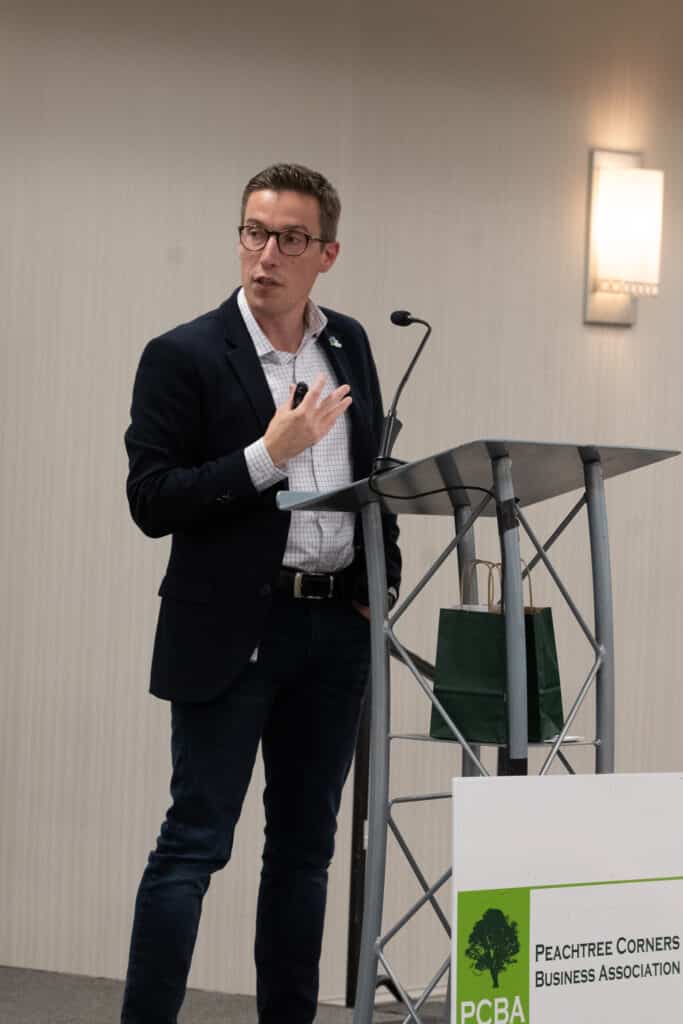
“That speaks to the importance of ensuring that we have a great community,” he said. “So at Partnership Gwinnett we work with all of our cities, and the county government as well, [on] a kind of a best-practices trip.”
He added that the peer tour allows everyone to know what the neighboring communities are doing and share the good news.
“We will take all of these elected officials, but also city staff, to different cities across the Southeast,” he said. “Last year, I believe they went to Huntsville, and have been to Greenville, Chattanooga — all cities that have done some really cool redevelopments that have taken their city to the next level. Our goal is to learn from them.”
Related
Read the Digital Edition
Subscribe
Keep Up With Peachtree Corners News
Join our mailing list to receive the latest news and updates from our team.
You have Successfully Subscribed!

From Boardrooms to the Himalayas: Vandana’s Journey to Purpose and Growing with Intention [Podcast]

Guardians of the Jukebox to Play the VoxStage on May 31

Brandon Branham Honored for Transformative Leadership in Peachtree Corners

Music Matters Productions Expands Peachtree Corners Headquarters

“Geek Culture” Shines at 2025 MomoCon

Celebration and Community: ICAGeorgia Wraps Up School Year with Two Festive Events

Vox-Pop-Uli Launches RED Initiative for Veterans’ Support

The PCBA Awards $500 to Light Up The Corners at After-Hours Event

Vox-Pop-Uli Launches RED Initiative for Veterans’ Support

The PCBA Awards $500 to Light Up The Corners at After-Hours Event

“Geek Culture” Shines at 2025 MomoCon

Celebration and Community: ICAGeorgia Wraps Up School Year with Two Festive Events

Guardians of the Jukebox to Play the VoxStage on May 31

Music Matters Productions Expands Peachtree Corners Headquarters

Brandon Branham Honored for Transformative Leadership in Peachtree Corners

From Boardrooms to the Himalayas: Vandana’s Journey to Purpose and Growing with Intention [Podcast]

Light up the Corners [Video]

Capitalist Sage: Business Leadership in Your Community [Podcast]

Cliff Bramble: A Culinary Adventure through Italy

Top 10 Brunch Places in Gwinnett County

A Hunger for Hospitality

THE CORNERS EPISODE 3 – BLAXICAN PART 1

Top 10 Indoor Things To Do This Winter

The ED Hour: What it takes to Remove Barriers from Education








